
THIS ISSUE Justice Minister first to sign Rule of Law Pledge THE EZINE OF THE LAW SOCIETY OF NORTHERN IRELAND ISSUE 244 Spring 2024 Climate Justice Groundbreaking Swiss Judgment Solicitor Admission Ceremony Report and photographs Bullying in the Workplace A Big Issue for the Legal Sector?
PUBLISHERS
The Law Society of Northern Ireland
Law Society House
96 Victoria Street
BELFAST BT1 3GN
Tel: 028 9023 1614
E-mail: writ@lawsoc-ni.org
Website: www.lawsoc-ni.org
EDITORIAL TEAM
Tony Caher, Editor
David A Lavery CB, Chief Executive
Alison Grundle
Peter O’Brien
Paul O’Connor
Derval McFetridge
Elizabeth Dowling
DESIGN
SHO Communications Consultants
DISCLAIMER
The Law Society of Northern Ireland and its agents accept no responsibility for the accuracy of contributed articles or statements appearing in this magazine and any view or opinions expressed are not necessarily those of the Law Society’s Council, save where otherwise indicated. No responsibility for loss or distress occasioned to any person acting or refraining from acting as a result of the material in this publication can be accepted by the authors, contributors, editor or publisher. The editor reserves the right to make publishing decisions on any advertisement or editorial article submitted to this magazine and to refuse publication or to edit any advertisement or editorial material as seems appropriate to the editor. The Law Society of Northern Ireland and its agents do not endorse any goods or services advertised, nor any claims or representations made in any advertisement in this magazine. No part of this publication may be reproduced without the written permission of the copyholder and publisher, application for which should be made to the publisher.
4 Ezine of the LSNI Autumn 2020 2 Ezine of the LSNI Spring 2024
© Law Society of Northern Ireland 2024 Writ readers can access back issues of the magazine as far back as October / December 2000 at www.lawsoc-ni.orgfollow Publications link www.lawsoc-ni.org 03 Foreword: Tony Caher 04 From the President 05 Justice Minister first to sign Rule of Law Pledge 06 Evidence to the Justice Committee at Stormont 07 What does Justice offer to the jurisdiction of Northern Ireland? 08 Solicitor Admission Ceremony 2024 12 Industrial Tribunal Decision overturned by Court of Appeal 14 Disabled Person Litigants Most at Risk within the Justice and Tribunal System 15 Groundbreaking Judgment in Swiss Climate Justice Case 17 Launch of Sustainability Strategy and Climate Justice CPD Series 17 Society supports Climate Action Programme 18 Blue-sky thinking on Climate Justice in Northern Ireland 19 Mediation for Environmental Disputes 20 Wellbeing support launched for solicitors and staff 22 Silencing Stigma and sustaining Self-Care 23 Inspiring Inclusion Theme of International Women’s Day 23 Will to Give 24 Local solicitor receives MBE for her charity work 26 Why is bullying such a big issue for the legal sector? 28 Northern Ireland Judicial Appointments Commission 29 I am not a Robot! 30 Anti-Money Laundering Update 32 Building resilience to Cyber-Crime 32 Society launches updated Call, Check, Confirm leaflet 33 Statutory Employment Rights payments increased 34 Obituary His Honour Judge Derek Rodgers 35 In Memoriam 35 Revised Guidance to Solicitors Accounts Regulations (SARS) 2014 36 SBA - Still working to support members of the profession 38 Risk Solutions for housing purchasers 39 Open University - leap into lifelong learning 40 Society represented at European Presidents’ Conference in Vienna 40 IPLS team win Client Consultation Competition 2024 41 The Newry & Banbridge Association dinner 42 The Limavady Solicitors’ Association dinner 42 BSA team pipped at the post in charity football event 43 New Houses in Multiple Occupation publication 43 Spring 2024 edition of Journal of Elder Law & Capacity 44 Mentoring Programme networking event 44 Law Society raises over £13,000 for Include Youth charity 45 Ross White elected as Chair of the NIYSA 46 From the Courts - Abstracts of recent Case Law Contents

Foreword
Dear Colleagues
I am delighted to introduce myself as the editor of the Writ magazine.
As you know, the Writ is published quarterly in digital format and that will continue in the foreseeable future. Its primary role is to provide solicitors with news, articles, events, issues and developments of interest and importance to the profession here in Northern Ireland and wider afield. The magazine is available to every solicitor, with or without a Practising Certificate, and to all individuals and organisations with an interest in the role of solicitors in this jurisdiction.
Under my editorship, the Writ will continue to feature major events in the Society’s calendar, including the Annual Conference and the Admission Ceremony. It will also continue to highlight how the Presidential Team,Council and the Secretariat raise the profile of solicitors and promote the interest of the profession locally and internationally.
Important features such as the Obituary section and the summary of Recent Court Judgments, expertly compiled by our librarian, Derval McFetridge, will continue to be given prominence.
In the future, I hope to reshape and redefine the Writ to demonstrate the Society’s commitment to support all solicitors, thereby encouraging all members of the profession to participate in the Society’s functions and to appreciate the challenges facing the Society in its representative and regulatory roles. I hope to include interviews with key persons in the media, Civil Service and business organisations.
The Writ has a wider readership than our own members and we should use this platform to demonstrate our commitment to hold the highest standards in the administration of justice and the wellbeing of society in Northern Ireland
I hope that you will participate in supporting the Writ. You can contact me at writ@lawsoc-ni.org
Finally, I wish to thank David A Lavery CB, the Society’s Chief Executive, for appointing me to this privileged role as Writ editor.
Tony Caher Editor
Ezine of the LSNI 3 Spring 2024

As I approach the halfway point of my Presidential year it is appropriate that I take this opportunity to reflect on the Society’s ongoing work on behalf of members.
I begin my report at the start of the year with the Special General Meeting (SGM) and I am grateful to the many members who attended in person and online and who contributed to what was an admittedly heated discussion on a complex issue – the National Minimum Wage as it applies to Trainee Solicitors.
Despite the difficult subject matter the SGM was a positive engagement with members and everyone who attended left with plenty to reflect on. If anything, the meeting has underscored the need for the Society to engage, communicate and listen more effectively and to continue to be responsive to the ‘real time’ issues affecting members and practices and where possible to improve. It is also clear to me that without modification to the process, small firms and those on legal aid are unlikely to be in a position to take on Trainees in future.
The process of delivering on the above has begun in a number of ways including the Local Association meetings which are currently underway, the development of new communication platforms to support members including a new membership platform and engagement with key decision makers on issues affecting our members such as legal aid.
As you will see in this edition of the Writ the Society has continued to represent and promote the solicitor profession on issues, including the Pledge to uphold the Rule of Law.
The Pledge, which to date has been signed by the Justice Minister, Naomi Long and Alyson Kilpatrick, Chief Commissioner, Northern Ireland Human Rights Commission (NIHRC), underscores their commitment to upholding the independence of the legal profession and the judiciary.
In early March the Society’s Chief Executive, David Lavery and I provided evidence to the Justice
From the President
Committee at Stormont on the vital role which solicitors play across Northern Ireland.
During our evidence we presented the Committee with advance copies of the Society’s new ‘Justice Agenda: A Plan for Better Justice’ which highlights the Justice priorities for political decision-makers.
The launch of the Pledge and our evidence before the Justice Committee is a clear demonstration of the Society’s ongoing work to ensure greater visibility of the important services our members provide to the community as well as the challenges they now face.
Our representation and engagement on behalf of members has continued on key issues including Legal Aid. Over the course of the last number of months the Society has met with the Justice Minister and her officials on legal aid funding and the justice budget.
Members will be aware the Society has met with His Honour Tom Burgess CBE, who is currently undertaking a fundamental review of the criminal legal aid framework in Northern Ireland.
We are grateful to Judge Burgess for his time and also to our members who have met, provided firsthand evidence and contributed to his review. The Society remains confident that the Review report, expected later this year, will provide the foundation for informed discussions about legal aid funding in Northern Ireland.
As I indicated previously, the Society recognises the need to improve communication with members and I am pleased to report that over the coming months the Society will begin to roll out new communications platforms including new ezine format and website to allow the Society to target communications in a timely and supportive manner.
I am grateful to the Member Services Team who are taking forward these initiatives and who have been instrumental in supporting the new Local Associations meetings which have been very useful in allowing the Society to engage more proactively on members’ issues at local level.
Time and space in this edition of the Writ prevent me from listing all of the issues and events over the last number of months but I would like to highlight a few which I believe are important to recognise.
In February 2024, the Presidential team and Registrar joined the Lady Chief Justice, Dame Siobhan Keegan for the Admission Ceremony at the Assembly Buildings in Belfast. Over 80 newly
admitted solicitors attended and were joined by family, friends and their Masters.
The future of the solicitor profession will be defined by our new members and it was heartening to see the next generation who in my view will undoubtedly make a positive contribution.
Throughout the last number of months I have been very fortunate to have represented the Society at a number of events abroad.
Many of these events are detailed in this edition but what is important to note is the genuine goodwill and respect shown to our Society by colleagues across the world.
Closer to home, I was delighted to attend a number of Local Association meetings throughout Northern Ireland and I am grateful for the hospitality and kindness shown to me at each event. It has also been very useful to have gleaned the “real life examples” that I have been able to bring to the Justice Committee and the Minister when highlighting particular issues and problems facing the profession, particularly some of the specific local issues.
The Writ magazine is a snapshot of the ongoing work of the Society at any given time. As someone who has had the privilege of peering ‘behind the curtain’ I can assure members that the work undertaken by the staff of the Society is often unseen, unheard but ongoing. I would like also to take this opportunity to welcome Tony Caher as the new Editor of The Writ. I believe Tony will bring a vital new perspective to our Society’s in-house magazine.
There is an acknowledgement that the Society needs to reset our engagement and communication strategies with members and I am pleased to report that this is underway.
However to make it successful it is very important that members get involved in the Society moving forward.
This means engaging, contributing to issues, standing for election and making a difference in shaping and defining the future of the Law Society of Northern Ireland.
I would strongly encourage you to do so!
Lastly I commend this edition of the Writ to you and hope you enjoy reading it.
Darren Toombs
4 Journal of the LSNI Spring 2024
Justice Minister first to sign Rule of Law Pledge
On Monday 25th March 2024, the Minister of Justice, Naomi Long MLA, became the first elected representative to commit to The Pledge to Uphold the Rule of Law, a new initiative brought forward by the Law Society of Northern Ireland.
The Pledge has been developed by the Law Society in response to increasing attacks on lawyers in the media and from politicians associating lawyers with the actions or causes of their clients.
Emphasising the importance of upholding the Rule of Law, Society President, Darren Toombs, said:
“We see the Pledge as an important first step in rebuilding respect for the Rule of Law and drawing a line under dangerous public comments which have seen lawyers come under attack simply for fulfilling their professional obligations. I welcome the leadership shown by the Justice Minister in becoming the first signatory to the Pledge. The Law Society will now be engaging with other MLAs and political parties to seek their support for this important initiative”.
Minister Long said: “I am committed to working in partnership to create a fair, just and safe community where we respect the law and each other.”
Signatories to the Pledge “recognise the Rule of Law as the foundation of a just and democratic society, commit to supporting and upholding the independence of the legal profession and the judiciary which underpin the Rule of Law.”
Signatories further commit to upholding six key principles: Independence, Responsibility, Fairness, Balance and Impartiality, Transparency and Accuracy.
Please click on https://www.lawsoc-ni.org/justice-minister-first-tosign-rule-of-law-pledge to download the Pledge.

In April 2024, Alyson Kilpatrick, Chief Commissioner, Northern Ireland Human Rights Commission (NIHRC) signed The Pledge to Uphold the Rule of Law.




THE PLEDGE TO UPHOLD THE RULE OF LAW
recognising the Rule of Law as the foundation of a just and democratic society, commit to supporting and upholding the independence of the legal profession and the judiciary which underpin the Rule of Law.
[ I / we ] will uphold the principles written here in order to ensure that those who work in the interests of justice are not subjected to threat or persecution.
Signed Date
Journal of the LSNI 5 Spring 2024
Minister of Justice, Naomi Long MLA pictured with Darren Toombs, President and Colin Mitchell, Vice-President of the Law Society of Northern Ireland signing the Pledge to Uphold the Rule of Law.
Evidence to the Justice Committee at Stormont
In early March the Society provided evidence to the Justice Committee at Stormont on the vital role that solicitors play across Northern Ireland.
The President and Chief Executive reminded the Committee that the Law Society had last appeared before them almost exactly two years previously as part of its efforts to challenge the Budget which would have seriously undermined Access to Justice in Northern Ireland.
The Budget was never implemented but two years on, and without a functioning government for most of that period, the core problems in our Justice system remain unaddressed with the solicitor profession and the people they serve suffering as a result.
The President and Chief Executive presented the Committee with advance copies of our new Justice Agenda: A Plan for Better Justice
This has been endorsed by Council as the Society’s key policy platform designed to influence and highlight Justice priorities for political decision-makers.
At the heart of the new Justice Agenda is the case for a sustainable Legal Aid budget which recognises the value solicitors bring in providing Access to Justice to people and communities.
The President reminded the Committee of the Society’s support for the Fundamental Criminal Legal Aid Review, being led by Judge Tom Burgess which it is hoped will bring a long overdue uplift in fees.
During the evidence submission the Society also called for further independent reviews for Civil and Family Legal Aid and the President took the opportunity to talk to the Committee about:

Justice Agenda
A Plan for Better Justice
- The challenges facing our small and general practices in recruiting and retaining trainees and our call for support in this area.
- The Society’s forthcoming ‘Rule of Law Pledge’ which aims to dissuade politicians attacking lawyers simply for carrying out their professional duties.
- The need for modernisation and reform of the Justice system and proper recognition of the role solicitors can play in improving Justice.
The Society’s engagement on members’ behalf often goes unseen and public sessions with the Justice Committee are the tip of the iceberg. Society office-bearers and staff are in regular contact with MPs, MLAs, government departments, agencies and more, all with the aims of improving legal services.

6 Ezine of the LSNI Spring 2024
David A Lavery CB, Chief Executive of the Law Society of Northern Ireland addresses the Justice Committee.
Darren Toombs, President, presents the Law Society’s Justice Agenda to the Committee.

Having qualified as a barrister in 1979, I was relatively complacent, and frankly uninformed, about bigger picture justice system issues. Since then, it has been my pleasure and privilege to work with and mentor many undergraduate and postgraduate law students and to regularly participate in continuous professional learning activities. In none of these environments do I recall ever reading or hearing about the rule of law.
However, once I started to specialise in public law I began to grasp the doctrine of the rule of law which, in turn, drew me to JUSTICE. The organisation’s reports and commentaries gave me an increasingly profound insight into the importance of the rule of law – a concept at the heart of the organisation. I joined JUSTICE as a member, alongside leading practitioners, academics and judicial office holders and my membership continues to this day.
When my appointment to judicial office materialised, I was pleased to discover that my JUSTICE membership could continue. This signified to me that the overarching goals of the independent judiciary, the legal profession and JUSTICE are, at heart, the same. Each is driven by the imperative of affirming, fortifying and implementing the rule of law.
So, what does JUSTICE offer to the jurisdiction of Northern Ireland? By serving as a key bridge between Northern Ireland and Westminster, the growing presence of JUSTICE members
What does JUSTICE offer to the jurisdiction of Northern Ireland? Lord Justice McCloskey
here promises to encourage and enrich cross-jurisdiction conversations and learning. I know they are keen to engage with the deep knowledge and experience contained within our legal ecosystem here and we are sure to gain much from their expert overview of the UK justice system.
Their primary areas of work coincide with many core issues confronting us in Northern Ireland. Over the next six years JUSTICE plans to have a fourfold focus: first, to repair and renew the UK’s commitment to the rule of law; second, to boost public understanding of the role and importance of our justice system; third, to challenge discrimination and inequality within the justice system; and fourth, to help build a well-functioning and people-centred justice system with trustworthy and effective data management.
Each one of these goals is highly relevant to the Northern Irish context. We have lessons to teach the rest of the UK about reconstructing legal stability and public trust in the justice system in challenging times. And we, like many other jurisdictions, have challenges to overcome to ensure our justice system is fair and accessible to all.
JUSTICE putting down deeper roots in Northern Ireland is, frankly, long overdue. A highly successful event to start this process was held at the Inn of Court on 1st February 2024. The packed venue was a most impressive sight and the quality of the event was indisputable. All concerned are to be warmly congratulated. This was a most encouraging beginning. The momentum thus gathered must not be lost. In particular, both the Law Society and The Bar can – and, I am sure, will – do much to ensure these promising shoots develop and flourish.
The judiciary of this jurisdiction, being the guardian of the rule of law, will assuredly play its part. One of the many notable successes of JUSTICE has been its ability to attract to its membership judicial office holders at the highest level, both active and retired
As the only NGO with oversight of the whole UK justice system, JUSTICE’s increased engagement with Northern Ireland promises to add an important system-wide perspective to our practice of the law and appreciation of the burning issues of the day and the organisation will help ensure that the deep, unique knowledge the Northern Irish legal profession, judiciary, academics and other organisations have amassed can benefit the whole of the UK.
Sadly, the threats to the rule of law in the UK are all too evident. I encourage all those committed to protecting the rule of law to join the organisation and am confident that local membership will flourish.
To JUSTICE I say: we look forward to working with you!

JUSTICE is a law reform charity and membership organisation working to build a fair, accessible justice system that respects the rights of all: https://justice.org.uk/
Ezine of the LSNI 7 Spring 2024
President welcomes newly admitted solicitors to the legal profession
The Assembly Buildings in Belfast City Centre was the venue for the Law Society of Northern Ireland’s 2024 Admission Ceremony which was held on 23 February 2024.
The Ceremony is an important event in the legal calendar marking the admission of the next generation of solicitors.
This year over 200 family, friends and Masters supported the 80 newly admitted solicitors as they were presented by the Registrar of Solicitors, David A. Lavery CB to the Lady Chief Justice for Northern Ireland, Dame Siobhan Keegan and the Society’s President, Darren Toombs.
Following their admission, the Lady Chief Justice and the President took the opportunity to present the Solicitors Accounts Prize to Paige Clements (O’Reilly Stewart Solicitors).
The Ceremony was also attended by the family of the late trainee solicitor, Edward Bergin,

and a posthumous Admission Certificate and Professional Conduct Prize were presented to his parents, Sean and Rosemary Bergin. In recognition of Edward’s passing the Society has renamed the Professional Conduct Prize the Edward Bergin Professional Conduct Prize.
Finally, the newly admitted solicitors were joined by The Lady Chief Justice and President for a series of year group photographs.
Commenting on the admission of new solicitors the President of the Law Society, Darren Toombs said:
“Today we celebrate the achievement and admission of our newly qualified solicitors to the legal profession in the presence of the Lady Chief Justice of Northern Ireland, The Right Honourable Dame Siobhan Keegan and their Masters, families and loved ones.
Today also presents us with an opportunity to remind ourselves of the contribution that the solicitor profession makes to our economy and its ongoing commitment to the community throughout Northern Ireland.
On behalf of the Law Society of Northern Ireland I wish each of our newly admitted solicitors a successful and fulfilling career.
I would also like to thank all of the Masters who offered the training opportunities to the newly admitted solicitors, over the two-year duration of their training contracts”
 The family of Edward Bergin receiving the Admission Certificate and Professional Conduct Prize from the Lady Chief Justice, Dame Siobhan Keegan and the President of the Law Society of Northern Ireland, Darren Toombs.
The family of Edward Bergin receiving the Admission Certificate and Professional Conduct Prize from the Lady Chief Justice, Dame Siobhan Keegan and the President of the Law Society of Northern Ireland, Darren Toombs.
8 Journal of the LSNI Spring 2024
From left: David A Lavery CB, Chief Executive, Brian Archer, immediate Past President, Dame Siobhan Keegan, Darren Toombs, President and Colin Mitchell, Vice-President.
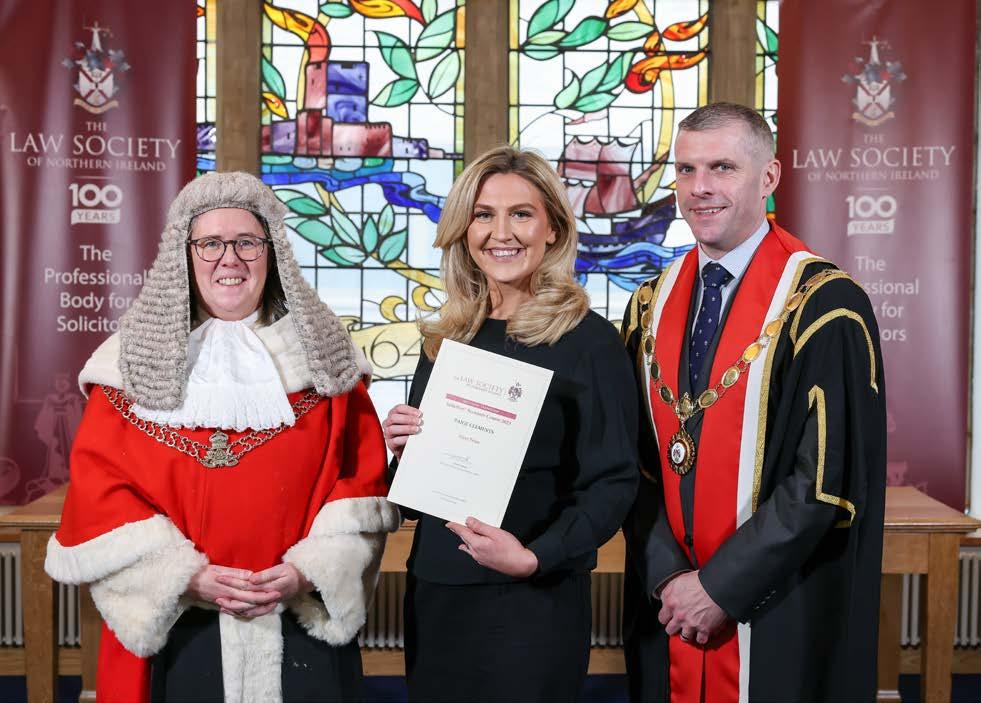
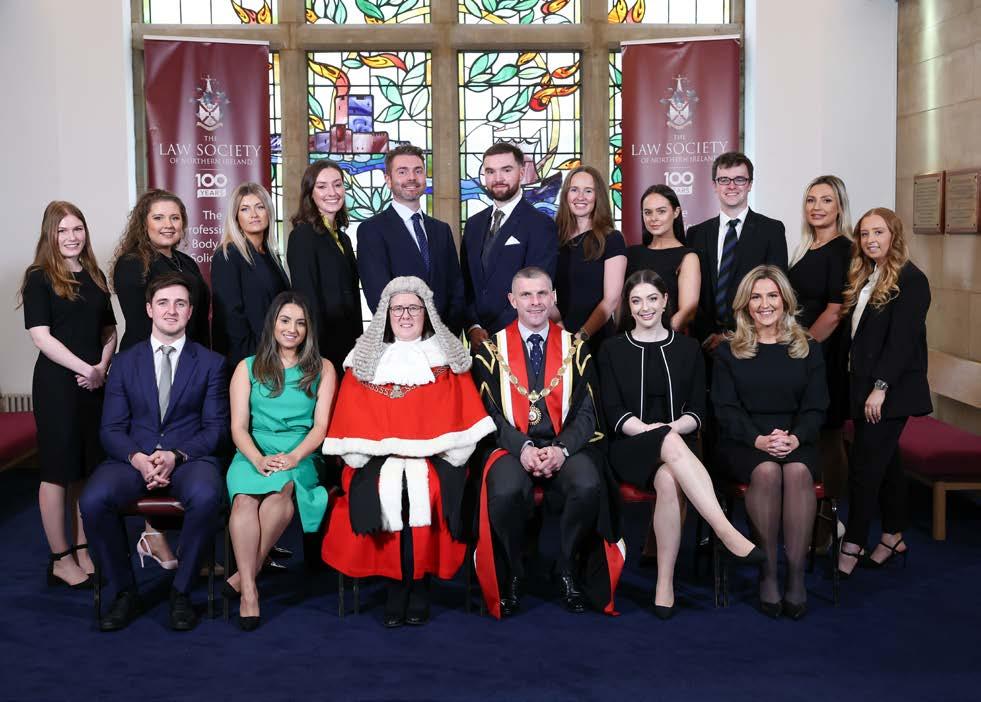
Journal of the LSNI 9 Spring 2024
Paige Clements was awarded the Solicitors Accounts Prize.
The Lady Chief Justice Dame Siobhan Keegan and President Darren Toombs with newly admitted solicitors.


10 Ezine of the LSNI Spring 2024
The Lady Chief Justice Dame Siobhan Keegan and President Darren Toombs with newly admitted solicitors.
The Lady Chief Justice Dame Siobhan Keegan and President Darren Toombs with newly admitted solicitors.

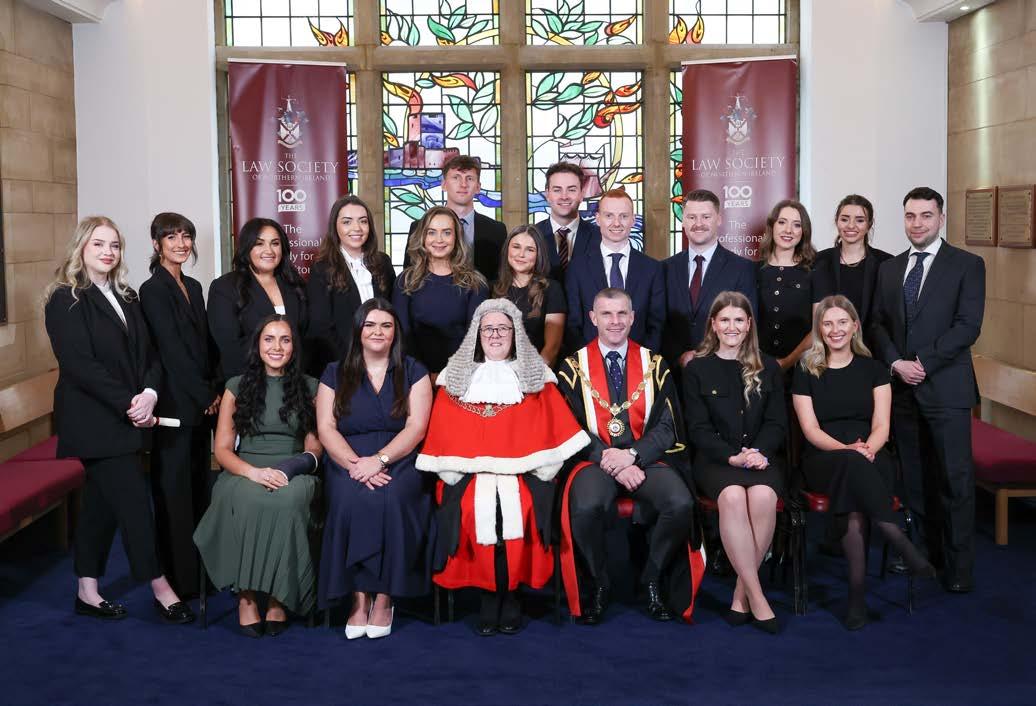
Ezine of the LSNI 11 Spring 2024
The Lady Chief Justice Dame Siobhan Keegan and President Darren Toombs with newly admitted solicitors.
The Lady Chief Justice Dame Siobhan Keegan and President Darren Toombs with newly admitted solicitors.
Industrial Tribunal decision in Peter Kelly v. Departments for Communities and Finance overturned by The Court of Appeal

Michelle Killough, Senior Legal Officer, Equality Commission for Northern Ireland
The Equality Commission supports legal cases on a strategic basis. Cases we support have the potential to make a real difference, not just to an individual claimant, but, as in this case, where it clarifies the law, and has the potential to benefit many people with disabilities in the future.
I am a Senior Legal Officer with the Equality Commission. We recently supported a case, Peter Kelly v Department for Communities and Department of Finance, to the Court of Appeal in Northern Ireland.
The Industrial Tribunal decision
Peter Kelly brought his original disability discrimination case to the Industrial Tribunal where it was heard in 2020 and 2021. Mr Kelly alleged that the respondents had discriminated against him based on a mental health disability. Specifically, he contended that he had been subject to direct discrimination, and failure to make reasonable adjustments in and about the management of his sickness leave.
The Tribunal considered evidence related to Peter Kelly’s disability, including internal medical records and testimony from two
consultant psychiatrists. The consultant psychiatrists agreed that Mr. Kelly lives with a long-standing generalised anxiety disorder, post-traumatic stress and obsessivecompulsive disorder. It was agreed that his conditions were long-term.
Mr Kelly relied upon the following provisions of Schedule 1 of the Disability Discrimination Act 1995 (DDA) to show a substantial effect on his day-to-day activities:
(a) Para 4(1)(g): memory or ability to concentrate, learn or understand; (here the appellant focused on ability to concentrate.)
(b) Para 4(1)(i): taking part in normal social reaction
(c) Para 4(1)(j): forming social relationships
The latter two activities were added pursuant to section 1(2) of the Autism Act (Northern Ireland) 2011.
Despite the medical evidence, the Industrial Tribunal dismissed Mr Kelly’s case in February 2022. It was dismissed on the grounds that at all times material to his claim Mr Kelly was not a disabled person for the purposes of the DDA and that therefore the Tribunal had no jurisdiction to determine his complaints. Consequently, his claims were dismissed.
It was at this stage Mr Kelly contacted the Equality Commission for Northern Ireland to help him challenge the Tribunal’s decision. The Commission’s Legal Funding Committee considered his application and approved Mr Kelly’s request for legal assistance to take his case to the Court of Appeal. His appeal was heard in November 2022 with the decision delivered in December 2023.
The Court of Appeal decision
The Court of Appeal overturned the Tribunal’s ruling with a unanimous decision. It allowed Mr. Kelly’s appeal, asserting that the Tribunal’s initial determination was “plainly wrong and infected with errors of law.”
So how did the Court of Appeal reach this conclusion and what does it mean for future disability discrimination cases?
Key Findings
1. Approach to determining disability:
The Court confirmed a Tribunal’s approach in determining whether a person has a disability is to consider:
(a) whether the person has a physical or mental impairment;
(b) whether the impairment affects the person’s ability to carry out normal day to day activities and must affect one of the specified areas set out in Schedule 1 of the DDA.
(c) the effect on such activities must be ‘substantial’ meaning “more than minor or trivial”); [see Goodwin v The Patent Office [1999] ICR 302; Vicary v BT PLC [1999] IRLR 680]
(d) the effects must be ‘long-term.’ [see Goodwin v The Patent Office]
2. Impairment and the Autism Act Amendments
The Court noted that the respondents’ position, accepted by the Tribunal was that the amendments made to Schedule 1 paragraph 4(1)(i) and (j) of the DDA 1995 by the 2011 Autism Act only apply to those people diagnosed with autism.
The Court found that the Tribunal’s ruling was plainly incorrect. It held no such limitation was inserted by the 2011 Act and no authority holding such a limitation exists. The Court confirmed the amendments were made without any limitation that they only applied to a person with a diagnosis of autism. They confirmed that the list of activities enumerated in paragraph 4(1) of Schedule 1 apply to all people in relation to whom the test of disability is being applied. The Court reiterated that the day-to-day activities
12 Ezine of the LSNI Spring 2024
defined within (i) and (j) of Schedule 1 fall to be considered for all persons claiming to be disabled as defined by the 1995 Act.
The Court further mentioned our own code, the Equality Commission (NI) Disability Code of Practice and noted that it was amended to insert the relevant activities without any mention of such a limitation.
The Court rejected the Tribunal’s finding and noted that the jurisprudence could not be clearer and that the symptoms of a condition are the focus, not the label given to conditions. The Court referred to Judge J Cockcroft’s comment:
“There is too much emphasis on attaching a label to the claimant’s condition and it is the contents of the jar, not the label that matters.”
3. Evidence Considered
The Court reviewed the evidence. Mr. Kelly’s medical history, internal records, and testimony from psychiatrists all played a crucial role. The Court also took into account that prior to the substantive hearing, there had been the need for a ground rules hearing. This was required to identify adjustments for the full hearing. There had been the need to delay/postpone proceedings and extend deadlines because the appellant was not fit to give instructions, comply with deadlines and take part in case management hearings due to his disability. It
was also noted that at hearing, the Tribunal was aware of the need for the appellant to take frequent breaks throughout the hearing, in particular throughout his evidence.
4. Tribunal using its own observations
The Court was critical that the Tribunal placed irrational weight on its own assessments of the appellant, particularly on documents compiled outside the working environment with the considerable assistance of another person. In Mahon v Accuread Ltd the EAT observed that a tribunal must be extremely careful about using their own observations as laymen to assess disability. Additionally, the Equal Treatment Bench Book warns that the effect of a person’s disability on them may be largely hidden and this ought to be appreciated. The Court repeated the need for Tribunals to have regard to the ETBB which was clearly set out by the Court in Galo v Bombardier (2016) NICA.
5. Respondents’ Position
Interestingly, despite categorizing Mr. Kelly as disabled for managing sickness absence since 2016, the respondents disputed that he was disabled for the purposes of the legislation during the hearing.
The Court’s Verdict
The Court of Appeal held that Mr. Kelly was indeed a disabled person within the meaning of the DDA. The reasoning was clear: the

Tribunal’s determination was wrong. The determination that the appellant was not a disabled person was not one which a Tribunal, properly applying the law, could reasonably have reached. By overturning the initial decision, the Court rectified a grave error.
Implications
This decision has far-reaching implications. The Court’s ruling confirms that the scope of the protections afforded by the Autism Act extends beyond those with a diagnosis of autism and can include others with disabilities/mental impairments which cause difficulties taking part in social interactions and forming social relationships. A person with, for example, depression could also be protected. It widens the scope of the protection afforded by the amendments of the Autism Act.
Conclusion
The resounding message from the Court of Appeal is that the job of the Tribunal is to look at the effects of the impairment on the ability to carry out the day-to-day activities listed in the Act and it’s the symptoms of a condition that should be the focus, not the label given to conditions. It is a legal and not a medical test.
Mr Kelly can now take his original disability discrimination case back to a differently constituted Industrial Tribunal.

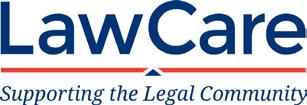
Ezine of the LSNI 13 Spring 2024
www.lawcare.org.uk

Disabled Person Litigants Most at Risk within the Justice and Tribunal System
The UN Committee on the Rights of Disabled People has raised concerns regarding barriers which disabled people face in accessing justice1. Disabled people face significant barriers in accessing justice. Research conducted by Disability Action on behalf of the Equality Commission demonstrates that
- 9 out of 10 disabled people report that there are negative attitudes and discrimination towards disabled people.
- 7 out 10 disabled people feel that they are not adequately protected from discrimination.
- 6 out of 10 disabled people feel that there is not enough financial support for disabled people to access justice in Northern Ireland.
Numerous obstacles hinder access to justice by disabled people. There is a significant deficiency in the availability of accessible information, advice, and support for accessing justice, which is compounded by limited access to advocacy services and legal aid. Additionally, disabled people are markedly underrepresented throughout the legal system, from courtrooms to law firms. The
challenges faced by disabled individuals are further exacerbated by pervasive negative attitudes and perceptions. Government bodies, the media, and the general public often hold and propagate these detrimental views, which not only undermine the dignity of disabled people but also contribute to a disproportionate incidence of hate crimes against them. This environment not only marginalises disabled people but also severely impacts their quality of life and ability to seek and receive justice.
Disabled people are more likely to experience exploitation and abuse in comparison with non-disabled people. Hate crime is soaring and there are increasing levels of awareness of the exploitation of disabled people by paramilitary and organised crime groups. Even though disabled people are more likely than other groups to experience crime and discrimination, disabled people face significant challenges securing legal representation. As a result, there is a significant population of personal litigants within both the justice and tribunal system.
The experience of being a personal litigant has a detrimental impact upon the physical
and mental well-being of personal litigants. Research has demonstrated that a person’s right to a fair trial may be at risk if they go to court without legal representation2. Personal Litigants encountered difficulties in accurately completing and submitting required legal documents, and in navigating legal arguments relevant to their cases3
Disability Action is calling for increased investment in advocacy and legal services, particularly for disabled people navigating the Employment Tribunal or Justice system. Current services are over-subscribed and under-resourced. Disability Action is also asking that legal firms consider ways in which they can better represent disabled people who cannot access legal aid and who are at risk of having to engage with the justice system and Employment Tribunal system un-represented.
1 UKIM (2018): Government’s response to the UN report on the Convention on the Rights of Persons with Disabilities: Briefing by the UK Independent Mechanism, Westminster Hall Debate 20 June 2018, p.1 (accessed 14 October 2021).
2 https://nihrc.org/news/detail/research-shows-right-toa-fair-trial-can-be-in-danger-if-individuals-go-to
3 https://nihrc.org/news/detail/research-shows-right-toa-fair-trial-can-be-in-danger-if-individuals-go-to

14 Ezine of the LSNI Spring 2024
Groundbreaking Judgment of European Court of Human Rights in Swiss Climate Justice Case


Marc Willers KC and Acland Bryant Garden Court Chambers
Introduction
The Law Society of Northern Ireland and the Public Interest Litigation Support Project recently hosted a CPD course on ‘Climate Justice’ but could not have predicted that it would coincide with the ground-breaking decision of the European Court of Human Rights (‘ECtHR’ or ‘Court’) in the case of KlimaSeniorinnen v Switzerland (the ‘Swiss Senior Women’s climate case’), in which it held that Council of Europe States have a positive obligation under Article 8 of the European Convention on Human Rights (‘ECHR’ or ‘Convention’) to protect their citizens from the impact and risks arising from dangerous climate change. In this short article we summarise the Court’s decision.
Swiss Senior Women’s climate case
In 2016 the KlimaSeniorinnen (the ‘Association of Swiss Senior Women for Climate Protection’, with 2500 members) together with four elderly women, filed a complaint against the Swiss government for its failure to take adequate steps to address climate change. That complaint was dismissed by the Swiss courts out of hand and so the applicants took their case to Strasbourg.
In March 2023, at a hearing before the ECtHR’s Grand Chamber, the applicants’ legal team presented agreed scientific evidence showing that older people - particularly elderly women - are more vulnerable to periods of intense heat.
They argued that Switzerland’s failure to adopt necessary GHG emission reduction targets violated their rights protected by Articles 2 and 8 of the Convention. Additionally, they claimed that the Swiss courts’ failure to address their complaint on the merits breached their rights protected by Articles 6 and 13 of the ECHR.
On 9 April 2024 the ECtHR gave its landmark judgment and ruled, in a near unanimous decision, that Switzerland had breached the Article 8 rights of the KlimaSeniorinnen’s members.
The judgment is a tour de force, as one might expect, given the novelty and importance of the subject matter. The majority took the trouble to carefully set out the facts, evidence, jurisprudence and legal background.
Ezine of the LSNI 15 Spring 2024

The majority noted that in 2015, in the face of incontrovertible scientific evidence that human-induced climate change was already causing harm to communities across the globe, nearly 200 States had adopted the Paris Agreement in 2015 (which set goals to limit global temperature rise to well below 2°C above pre-industrial levels and pursue efforts to limit the temperature increase to no more than a 1.5°C increase). The majority also noted the clear statement by the Intergovernmental Panel on Climate Change that there ‘was a rapidly closing window of opportunity to secure a liveable and sustainable future for all’ and that the ‘choices and actions implemented in this decade would have impacts for now and thousands of years’ [118]
Having done so, the majority recognised, for the first time, that the Convention imposes positive obligations on states: ‘to adopt, and to effectively apply in practice, regulations and measures capable of mitigating the existing and potentially irreversible, future effects of climate change’ [545]; and to put in place ‘the necessary regulations and measures aimed at preventing an increase in GHG concentrations in the Earth’s atmosphere and a rise in global average temperature beyond levels capable of producing serious and irreversible adverse effects on human rights’ [546].
The majority acknowledged the ECtHR’s subsidiary role as a supra-national court and
that states enjoy a margin of appreciation when setting their own laws and adopting measures to cut emissions to meet the thresholds laid down in the Paris Agreement [543]. However, the majority held that when assessing whether a State had remained within that margin of appreciation, it would examine what steps a State had taken to: adopt general measures, specifying a target timeline to achieve carbon neutrality and the remaining carbon budget; set out intermediate GHG emission targets and pathways; provide evidence of compliance; keep the GHG reduction targets updated; and act in good time and in an appropriate and consistent manner [550].
Applying that approach, the Court held that Switzerland’s failure to quantify, through a carbon budget or otherwise, future national GHG emissions limitations, as well as its failure to meet past GHG emission reduction targets had breached the Article 8 rights of the
members of the KlimaSeniorinnen [558 – 559]; and that the Swiss courts’ failure to determine their complaint violated their Article 6 rights to a fair trial [629-640].
Conclusion
The judgment is testament to the inspirational members of the KlimaSeniorinnen and the tenacity and courage of their team of Swiss lawyers, supported as they were by Greenpeace. It is a judgment not just for the elderly but for all generations.
Predictably, the decision has been criticised by some commentators as an exercise in judicial overreach. But that criticism is wholly misplaced. Essentially, the majority has held no more than that States should, at the very least, comply with the laws that they have themselves adopted, including international obligations under climate change treaties that they have ratified [420 and 546].
16 Ezine of the LSNI Spring 2024
Launch of Sustainability Strategy and Climate Justice CPD Series
The Law Society of Northern Ireland has launched its Sustainability Strategy, setting out a roadmap towards a more sustainable future for the Society and the solicitor profession in Northern Ireland.
The Strategy, which can be accessed here, builds on the Society’s Climate Resolution, and contains actions across 4 themes: Sustainable Workplace, Stakeholder Engagement, Training and Development, and Climate Justice.
A key element of the Strategy is direct training and support for Law Society members. The Society is therefore pleased to be partnering with the Public Interest Litigation Support (PILS) Project to deliver a Climate Justice CPD series for members.
Society supports Climate Action Programme
Law Society of Northern Ireland staff were in attendance at the recent Business in the Community (BITC) ‘Climate Action Programme’ held in Belfast City Centre.
The programme which is supported by Danske Bank is part of Business Action on Climate which aims to put Northern Ireland businesses at the forefront of the climate emergency.
The programme provided attendees with the perfect platform to meet with colleagues to discuss current climate issues of importance.
Those attending had an opportunity to hear from a panel of experts on climate issues including Jamie Warnock, the Law Society’s former Head of Policy and Engagement, who provided his insight as part of the panel discussion.

At the conclusion of the programme, the Society was delighted to receive its Climate Action Completion Certificate.
The Society continues to engage with the solicitor profession on climate issues and remains fully committed to initiatives such as the Climate Action Programme which supports local businesses.
Ezine of the LSNI 17 Spring 2024
The Law Society of Northern Ireland Sustainability Strategy
Jamie Warnock (2nd from left) with Fiona Dowds from the Law Society of Northern Ireland.
Blue-sky thinking on Climate Justice in Northern Ireland
Those attending had an opportunity to hear from speakers including Katie de Kauwe, a solicitor working for Friends of the Earth. Katie provided an overview of climate justice, its link to human rights and the key international and EU legal instruments that are relevant for the purposes of advancing climate justice litigation.
Also speaking at the event was Marc Willers KC, who provided an overview of key jurisprudence relevant to climate litigation. Mr Willers is a renowned KC, who specialises in environmental law and climate justice and has been involved in high profile litigation in the area of climate justice, including at the European Court level (see page 15).
The training programme continued with session two in April 2024, with a focus on relevant pieces of legislation including the Climate Change Act (Northern Ireland) 2022 and the Aarhus Convention and corresponding regulations.
for local solicitors and their clients. We are grateful to Katie De Kauwe from Friends of the Earth and Marc Willers KC for their invaluable contributions to making this first event such a success.”
The Director of PILS, Maria McCloskey said -
“Law is not the only answer to the climate crisis, but I believe it is a vital part of it. Reading the positive feedback from attendees at the first CPD session gave the PILS team real encouragement.
There is a clear appetite among local lawyers to get involved in the fight for climate justice. We are delighted to have created this CPD series for them”
Marc Willers KC said -
Issues surrounding Climate Justice in Northern Ireland were examined at a unique event marking the launch of a new training programme aimed at members of the legal profession.
The new training programme has been launched by the Law Society of Northern Ireland in partnership with Public Interest Litigation Support (PILS) and aims to inspire, empower and support solicitors providing services to clients in the emerging areas of environmental law and climate justice. Solicitors from across Northern Ireland attended the first event on the theme ‘Climate Justice Litigation’ at Law Society House in Belfast.
The last part of the programme which was held in May 2024, included a focus on local campaign groups, the issues they are working on, as well as presentations on climate-related legal action that has taken place in Northern Ireland, including the use of Third-Party Interventions.
Commenting about the first event in the training programme, Dr Andrew Godden, Professional Development & Training Lead said –
“We are delighted to be working in partnership with Public Interest Litigation Support (PILS) on this critical issue which has implications

“My thanks to all at the Law Society of Northern Ireland and the PILS Project for inviting me to speak in Belfast at the first session of Climate Justice CPD Series. The next sessions look excellent, and I am sure they will inspire lawyers in Northern Ireland to take on climate justice work in the future.”
Commenting Katie de Kauwe from Friends of the Earth -
“As an environmental and social justice organisation, Friends of the Earth is committed to working alongside and supporting grassroots groups in their efforts to tackle the climate and nature crises.
“We have supported communities resisting fossil fuel infrastructure across the UK. Whether that’s intervening to support an activist’s legal case against an oil development in Surrey or working with community groups to bring a court case against a major fossil fuel storage on the Antrim Coast , we believe that taking legal challenges can be a powerful way to hold governments and big business accountable for climate-harming decisions. And in the process, to shine a spotlight on critical issues”.

18 Journal of the LSNI Spring 2024
PILS team with Marc Willers KC, Katie de Kauwe from Friends of the Earth and Director of PILS, Maria McCloskey.

Mediation for Environmental Disputes

Brian Speers, Immediate Past President, Commonwealth Lawyers Association
When I was President of the Commonwealth Lawyers Association, I visited the Sabah Law Society in Kota Kinabalu. Sabah is one of the three jurisdictions that make up Malaysia. Sabah and Sarawak, one of the other provinces, are located on the northwest of the island of Borneo.
When there in September 2022 I formed the plan that the Commonwealth Lawyers Association jointly with the Sabah Law Society should host an international climate justice conference in Kota Kinabalu. The Borneo Rain Forest Law Conference took place between 26th and 29th February 2024. It was attended by lawyers from 25 countries. In addition to arranging fascinating speakers dealing with corporate social responsibility, carbon credits and climate mitigation funding mechanisms, I had arranged for a session on mediation for environmental disputes.
A very impressive panel of speakers was involved. I chaired the panel which comprised Lord Carnwath retired Judge of the UK Supreme Court; Gregory Vijayendran, former President
of the Law Society of Singapore and a member of the board of the Singapore International Mediation Centre; Mary Walker one of Australia’s leading Mediation Advocates and a highly experienced Environmental Mediator, and Datuk Joy Appukuttan a senior lawyer from Kuala Lumpur.
The session was well attended by delegates. Lord Carnwath described his experience of mediating a dispute involving a controversial landfill site in the Midlands. He described an inclusive process and was pleased that the agreement he helped the parties to reach had been fully implemented. Datuk Joy described the position of mediation in Malaysia and the formation of the Sabah International Arbitration and Mediation Centre. Gregory Vijayendran not only described his experience of multi-party environmental disputes but also clarified the role of the Singapore International Mediation Centre and described the Singapore Convention on the enforcement of agreements made in mediation. This UN Convention is now ratified by 56 countries including the UK.
Mary Walker gave a fascinating insight into the practical realities of mediating an environmental dispute. These disputes can include issues involving noxious smells or damaging emissions from mining.
The pollution of water courses, damage to air quality and the erosion of ground cover can have very significant environmental impacts not just in small urban settlements but in local communities. Such disputes often involve public meetings, public consultation and private discussions between community leaders, developers and state agencies.
The session considered the interesting issue of whether discussions held in private are ever appropriate in disputes which affect the community at large.
My overall impression is that the process of mediation - which involves gaining trust, establishing a satisfactory process, speaking to people individually and then creating options for consideration and involving all necessary stakeholders - is an appropriate process for environmental disputes.
I returned from the Borneo Rainforest Law Conference fortified again in my belief that mediation is something to be promoted and is entirely suitable, adaptable and flexible for a wide variety of disputes including environmental disputes.

Journal of the LSNI 19 Spring 2024
Lord Carnwath, UK, Mary Walker, Australia, Brian Speers, UK,Gregory Vijayendran,Singapore, Joy Appukuttan,Malaysia.
Wellbeing support launched for solicitors and staff
The importance of good mental health and wellbeing have been highlighted with the launch of a new initiative aimed at supporting members of the legal profession and their support staff in Northern Ireland.
The new Wellbeing initiative has been launched by the Law Society of Northern Ireland and aims to provide its members with access to practical and accessible information from a range of leading organisations offering guidance and support on mental health issues.
The Society has updated its Wellbeing Toolkit, an interactive digital support document which provides comprehensive information on issues impacting mental health as well as signposting to relevant organisations who can provide professional help and support.
The Society intends to use the digital Toolkit as a resource which can be updated with new information, guidance and updates when needed.
It is hoped that the Toolkit will be of practical benefit to individuals and firms and will contribute towards continuing the important and vital conversations to reduce the stigma around mental health issues and to encourage a supportive culture within the legal profession.
As part of the new Wellbeing initiative members can also access a short video from the Equality Commission on employer responsibilities around mental wellbeing in the workplace and sign up to attend an in person seminar hosted by Dr Garry AdairGilliland, Lead GP at Kingsbridge Private Hospital, Belfast on general health issues including menopause, HRT, prostate health advice as well as answering questions from attendees.
Launching the new initiative, the Society’s President, Darren Toombs said: -

“I am delighted to launch the Wellbeing initiative and new Toolkit which will complement the services offered by LawCare, with whom the Society continues to work closely on important issues affecting the solicitor profession in Northern Ireland. I would also like to take this opportunity to thank the Equality Commission and Kingsbridge Private Hospital for their support. I would encourage members and their support staff to download the new Toolkit, access the information online and sign up to the seminar as part of the new Wellbeing initiative”.
Niamh Warnock, Engagement and Relationship Manager, LawCare said: -
“At LawCare we are excited to support the launch of the new Wellbeing Toolkit, a crucial resource packed with practical guidance for people in Northern Ireland’s legal sector who are navigating mental health challenges. We know that many have concerns about reaching out for support for mental health concerns and believe the Society’s dedication to this cause plays a key role in breaking down the stigma that still exists around seeking this support.
The refreshed toolkit features numerous resources from LawCare, and is something we’re actively promoting, supporting any effort that ensures mental health struggles are approached with empathy and understanding, ultimately creating an environment where everyone can thrive.”
Information about the new Wellbeing toolkit can be downloaded from https://www.lawsocni.org/DatabaseDocs/new_4787657__law_ society_wellbeing_toolkit250324.pdf
Niahm Warnock, Engagement and Relationship Manager for LawCare with Darren Toombs, President.
20 Journal of the LSNI Spring 2024
Menopause,
A Hot Topic!
The menopause is a natural part of a woman’s life that usually occurs between 45 and 55 years of age, as a woman’s oestrogen levels decline.

In the UK, the average age for a woman to reach the menopause is
51
however
1 in 100
women experience an early menopause or premature ovarian insufficiency under the age of 40
The Menopause presents itself at the point in time 12 months after a woman’s last period. However, in the years leading up to that point, women can experience several symptoms. This is called the menopausal transition, or perimenopause
75% of woman have symptoms and these may last on average 5 years, or sometimes more.
Symptoms associated with the menopausal transition include anxiety, low mood, poor concentration and memory, hot flushes, night sweats, insomnia and vaginal dryness.
What treatments are available?
There are a lot of myths and misconceptions about menopause and the treatment options available, however it is vital women are given accurate information to help them make an informed choice as to how best to manage their symptoms and improve their general health and wellbeing.
Hormone Replacement Therapy (HRT) is a treatment which replaces hormones that are at a lower level as you approach the menopause. It provides symptom relief alongside heart and bone protection and aims to outweigh menopausal symptoms helping you get back on track and feeling like your normal self. Woman under the age of 40 are also recommended to take HRT even if asymptomatic for heart and bone protection. You can usually begin HRT as soon as you start experiencing menopausal symptoms.
There is a small risk of breast cancer with some HRT preparations however the risk is lower than being overweight or drinking alcohol regularly. For the majority of women, the benefits of HRT outweigh the risks.
Speak to a GP if you’re interested in starting HRT. There are a range of HRT options available to suit you!
There are also several natural ways which can help relieve menopausal symptoms and these include maintaining a healthy weight, exercising regularly, avoiding caffeine, alcohol or sugary foods, drinking 8-12 glasses of water a day, stopping smoking and Cognitive Behavioural Therapy (CBT).

Dr Siobhan Kirk, Consultant in Sexual & Reproductive Health in the Belfast Trust runs a dedicated Menopause Clinic within Kingsbridge. She discusses all things perimenopause, the menopause and HRT in our HealthStyle podcast. Click play to have a listen.
If you would like to speak to a GP or Menopause specialist at Kingsbridge, please email membership@kingsbridgeprivatehospital.com
Pr
ivate Hospit al Group
Silencing Stigma and Sustaining Self-Care
 Nuala McMahon, Senior Policy Officer, Law Society of Northern Ireland
Nuala McMahon, Senior Policy Officer, Law Society of Northern Ireland
In this article Nuala McMahon highlights some further Society initiatives around Wellbeing aimed at supporting solicitors.
When you hear the word ‘Wellbeing’, many often think about physical health including eating healthily or exercising. The reality is that Wellbeing encompasses various aspects of life, including developing a positive mindset, seeking personal fulfilment, cultivating a life of balance, adopting methods to manage stress and understanding when to seek help.
In the hustle and bustle of modern life, among the many demands of careers, family life, relationships and personal aspirations, one fundamental aspect often takes a backseat, and this is Wellbeing. This can have a snowballing effect, leading to high rates of stress, a risk of burnout, or struggles with mental health. The recent initiatives adopted by the Law Society aim to ensure that Wellbeing takes a front-seat for all to foster a culture of Wellbeing within the profession.
Supporting Solicitors
Solicitors guide clients through many of life’s key moments such as buying a home,
making a will, dealing with the future of children in a relationship breakdown, or setting up a business. While some of these are rewarding, joyous occasions, solicitors are often exposed to sad, tragic events and experiences in an individual’s life. It is in these times of crisis that a solicitor often acts as the ‘first responder’ in offering solutions and becoming an anchor for clients. This can be more acute in certain areas of practice such as criminal, immigration, family, or personal injury, to name but a few, and can result in the solicitor acquiring secondary trauma.
A series of Wellbeing related initiatives undertaken by the Society in April 2024, aimed to provide practical and accessible information from a range of leading organisations offering guidance and support on mental health issues. These included an updated Wellbeing Toolkit - an interactive digital support document which includes information on a range of topics such as different types of mental health conditions, typical issues and factors impacting on mental health, as well as signposting members to relevant organisations who can provide professional help and support.
It is intended that the revised Toolkit complements the services offered by LawCare, the mental health charity for the legal sector, with whom the Society continues to work closely. However, it should be stressed that LawCare operates totally independently from the Society and members are encouraged to avail of their services when required, further details of which can be accessed here
As part of the recent initiatives, members can also access a short video from the Equality Commission for Northern Ireland (ECNI) on employer responsibilities around mental wellbeing in the workplace, which covers topics such as barriers to good mental health at work, practical steps that employers can take and how the ECNI can help.
The Society has also worked in conjunction with Kingsbridge Membership Club to organise a free Practical Health Guidance CPD Seminar. This was delivered by Dr Garry Adair-Gilliland, Lead GP at Kingsbridge Private Hospital Belfast and covered general health issues including the menopause, HRT, and prostate health advice. Further such events are being considered.
Silencing Stigma
It is unfortunate that many common misconceptions and myths remain around mental health, ranging from the view that seeking help is a “sign of weakness” or the fear that you may be treated differently by colleagues or clients. These can deter individuals from seeking the support and help they need. It is hoped that the publication of the Toolkit, the display of Wellbeing posters in Law Society House and across courthouses in Northern Ireland and the other initiatives will play a role in breaking down the stigma that still exists around seeking support.
When talking about Wellbeing becomes normal, rather than a crisis conversation, this will help to reduce the feeling of vulnerability amongst those experiencing any challenges. The more Wellbeing becomes a conscious element of personal and business management, the less stigma will exist around speaking out and seeking help, and this will help create a healthier, more resilient legal profession.
Sustaining Self-Care
As the world in which we work and live becomes increasingly interconnected, and fastpaced, the importance of nurturing our mental, emotional and physical health has never been more crucial. The highly pressurised, sometimes distressing and emotionally taxing situations in which solicitors work add to the already demanding role of being a solicitor. The role is undoubtedly fused with pressure to perform, meet deadlines, manage large caseloads and the need to attract business to firms. Balancing all these demands and pressures can take a toll on Wellbeing if not managed effectively.
The ‘Ways of Helping’ section in the Toolkit provides a range of useful tips and ideas on how to sustain self-care. Sustaining self-care is a positive duty we owe ourselves and this should be promoted within firms and among colleagues. Ignoring or overlooking early warning signs can have negative consequences and result in a snowballing effect.
In conclusion, the Society’s recent initiatives on Wellbeing are driven by a recognition of the pressing need to support solicitors to address challenges and pressures they are faced with. Maintaining Wellbeing is paramount so that all within the profession can thrive personally and professionally, resulting in benefits for all.
22 Ezine of the LSNI Spring 2024
Inspiring Inclusion theme of International Women’s Day
International Women’s Day event discusses inclusion in the legal profession in Northern Ireland
Inspiring Inclusion was the theme of an important event taking place at Law Society House in Belfast marking International Women’s Day.
Over fifty members of the legal profession attended the event which had been organised by Legal Women and sponsored by the Law Society of Northern Ireland, Caldwell & Robinson Solicitors and Donaghy & Chance, Business and Marketing Consultancy
Those attending had the opportunity to hear from several keynote speakers including The Lady Chief Justice, The Right Honourable, Dame Siobhan Keegan and the founder and editor-in-chief of Legal Women, Coral Hill
The Lady Chief Justice took the occasion to reflect on issues of importance around inclusion within the legal profession and how to develop an inclusive profession for the 21st century.
Will to Give
Brian Grzymek

Legacy giving often involves people wanting to make a positive gesture to help others when they die.
Those who consider doing this are often unsure as to how best to translate their good intention into practice.
In many cases clients seek the good advice from a solicitor as to how best to progress matters and what course of action to take.
Increasingly we live in an age where the ‘Baby Boomer’ cohort of the population is now passing through retirement often with significant resources and a strong desire to leave the world better than they found it.
The Boomers are often keen to support local charities especially if they have lost a loved one to a terrible condition such as cancer.
In Northern Ireland ‘Will to Give’ is a registered charity, set up to promote and support legacy giving.
Working with local and national charities with a local presence, Will to Give aims to facilitate legacy giving by:
1. raising awareness of its importance to our charities; and
2. assisting legal professionals in offering expert advice to their clients.
To help solicitors, Will to Give is now providing a database of local charities providing accessible (brief) summary of their work and focus.
To further help Solicitors’ Practices, Will to Give will shortly be sending QR cards with a code to make access to the database even easier.
Working in partnership with the Law Society of Northern Ireland, Will to Give is also arranging a seminar in September 2024 offering CPD hours. It will be delivered by local and national experts on legacy giving, will provide a fantastic opportunity for practices to get up to date with current thinking and ensure that they can provide the best service to their clients in this area. Details of the seminar are currently being finalised and will be released to Society members in coming weeks.

Ezine of the LSNI 23 Spring 2024
In the photo - Eileen Donaghy, Donaghy & Chance, Coral Hill, Founder & editor-in-chief of Legal Women, Lady Chief Justice, Caroline Glover, LSNI and Karen O’Leary, Caldwell & Robinson.

1. How do you juggle being a practising solicitor, mum and running a charity?
I think like many women who are mums and solicitors, they don’t think about what they are ‘juggling’, they just get on and get it done.
Don’t get me wrong it is never easy. It can be frustrating and exhausting but being a mum, solicitor and leading a charity brings with it great rewards which fill me with happiness, satisfaction and pride.
2. Do you ever get stressed out doing so many things at once?
Of course, but I am very fortunate to be surrounded by people who are incredibly supportive.
I’m very fortunate as I love working as a solicitor for the Directorate of Legal Services. It’s a wonderful place to work and whilst the demands of the job can often feel a little overwhelming, I am surrounded by amazingly talented colleagues who are so supportive of me and of The Boom Foundation.
I set up the Foundation over 11 years ago and it has gone from strength to strength. I am very proud of the work we do and the exceptional volunteers and trustees who give of their own free time to assist with the running of Boom. They are invaluable friends without whom I really couldn’t do it.
What really stresses me out is the constant worry of ensuring that we have a steady stream of funds to be able to provide patients with financial support at a time in their lives when they need help the most.
I never want to be in a position where we would have to refuse support. That sense of responsibility is what keeps me driven and ensures that I keep all the plates spinning.
Lastly my family keep me very level-headed. Being a mum is the most fulfilling role as I have two beautiful girls who allow me to properly switch off and recharge amidst endless Disney movies and cuddles!
They keep me grounded. For instance, I came home from my recent visit to Windsor Castle to be faced with the challenges of removing a melted Milky Way from the sofa - such are the joys of motherhood!
My husband is also so incredibly supportive of me and the girls. He’s the quiet man - always there for me when I have a case running in the Tribunal, out doing a Boom event or in need of a whinge.
3. How do you feel about being awarded an MBE in the recent Honours List?
It is such an honour and privilege to have received an MBE. The investiture at Windsor was truly a surreal and fantastic experience
Local solicitor receives MBE for her charity work
Leona O’Neill receiving an MBE for services to her charitable fundraising for people with sarcoma from the Princess Royal at an investiture at Windsor Castle on Wednesday 20th March 2024.
and one not to be forgotten. Little girls might spend their lives practising the perfect curtsey but, in your late 30s, it’s a rather nervewracking experience!
The award of the MBE was very much in recognition of the unseen and unheard work of all the trustees and volunteers who give their free time and passion to support the charity and the families we support.
4. How important is The Boom Foundation charity in your life?
Boom is a huge part of my life as I recall vividly that it brought me great comfort at a very low point in my life. I have an undefinable connection with Boom. It remains a big part of my life and as it evolves, I can see the huge journey of its evolution from something which supported me to something which supports so many sarcoma patients. The momentum of wanting to help others is in many ways something which has helped me immensely.
5. What piece of advice do you always follow?
‘Keep life in perspective’. Every day brings new challenges, and it can be overwhelming. We can allow ourselves to get caught in the chaos of the mundane and the new. I try to appreciate all the things I have. I really do believe it is a blessing to be busy and capable.
24 Ezine of the LSNI Spring 2024
6. Who has been the most inspiring person in your life and why?
My best friend, without doubt. She is a very humble person - kindness personified and always putting others before herself. I am truly blessed that I have her friendship. She always has time for me, often making the tough situations bearable and the ordinary ones so enjoyable. Again, another example of a woman who continues to balance life as a busy mum, achieving so much professionally and is so well respected among colleagues and friends. An inspiration with a beautifully infectious laugh!
7. Would you encourage your children to follow you into the legal profession?
Yes, I absolutely would. I get great work satisfaction and it’s an exceptionally rewarding job with lots of opportunity. There really is no end to the learning! Perhaps I’m slightly biased but I also think my two girls could make wonderful solicitors - they are already skilled negotiators!
8. What aspects of your job as a solicitor do you love and what are the down sides?
There isn’t too much that I dislike about the job. Perhaps the stress associated with the
job at times is certainly a downside, but it is far outweighed by the quality of the work and the professional relationships that I have with colleagues and clients. Employment law is a great specialism. One of the nice things about working in Northern Ireland within a niche specialism is the close working relationships with my employment law counterparts.
9. You have achieved a lot in your personal and professional life - what do you put that down to?
A healthy mix of stubbornness, determination, hard work and the people around me who are a constant support. I don’t think it’s possible to achieve without others pushing you onwards and upwards.
10. Why should people support The Boom Foundation?
The thing that I am most proud of about Boom is that, thanks to the hard work of its trustees and volunteers, we can ensure that all the money raised goes directly to support patients (50% to research through Sarcoma UK and the other 50% directly to patients).
The support that we can provide makes such a huge difference to families across Northern Ireland. Typically, I find that Northern Irish
people aren’t very good at asking for help. When someone is diagnosed with sarcoma, we don’t want them to need to ask. We have a unique referral system in place with the Belfast Trust and Southeastern Trust which allows sarcoma clinical nurse specialists to refer patients directly to Boom once diagnosed and let us know what support they may need. That then allows us to tailor support to individual patients’ needs. More information can be found on our website https://www.theboomfoundation.co.uk/
11. How can they support The Boom Foundation?
For those who would like to support Boom, donations can be made via our Just Giving page The Boom Foundation - JustGiving
We are always so grateful for any donations or for anyone who chooses to fundraise for us –whether it be a coffee morning, relay teams in the Marathon, ‘squats for sarcoma’ – the list is endless. If anyone is interested in fundraising for Boom, please get in touch. The simplest thing, which is of huge support, is just to talk about the charity, use the word ‘sarcoma’ and by doing that, we are continuing to raise awareness of Sarcoma Cancer throughout the profession. Like all cancer, early diagnosis will save lives.

Sign in on the day - Open from 2pm to sign in and collect your t-shirt Walk / Run starts - 4pm
Ezine of the LSNI 25 Spring 2024 Save the Date Friday 28th June 2024 In Support of BOOM FOUNDATION To register for the event please click here or scan the QR code Cost £25 per entrant Closing date for entries 13th June

Why is bullying still such a big issue for the legal sector?
Bullying remains a very common concern within the legal sector, and in 2023 there was an alarming 95% increase in the number of people contacting LawCare for support because of bullying, harassment or discrimination at work.
People who got in touch often said that they thought that bullying would never happen to them, and that they didn’t feel able to speak out about it once it had. One trainee solicitor who was being bullied felt that they had to ‘stick it out’ until the end of their training contract. Another legal professional said that caring responsibilities and financial pressures made them feel trapped in their role.
Yet bullying is much more than just a problem for individuals, it also has a detrimental effect on legal organisations and the sector as a whole.
Bullying in the legal sector is not a new problem; it has been around for decades. So, is bullying just a price we pay for working in such a competitive and demanding profession? We don’t think so.
Why does bullying thrive in the legal workplace?
The hierarchical and fast paced nature of working in the law can create an environment where bullying behaviours can thrive, particularly when bullying behaviour is not challenged.
LawCare’s Life in the Law research showed that people working in the legal sector struggle with burnout, lack of autonomy at work, poor psychological safety, and very high workloads. These can create a stressful work environment where bullying can flourish. This situation is exacerbated by managers who often lack the skills and time to manage conflicts when they arise. They avoid confrontation, so issues escalate, and bullying persists unchallenged.
The impact of bullying
Bullying takes many forms, from verbal abuse and micro-management to setting unrealistic deadlines and systematic exclusion. The effects of workplace bullying can be farreaching; it impacts the person being bullied, the rest of the organisation and the legal sector as a whole.
Bullying has a damaging impact on people’s lives and performance at work. Many people experience physical symptoms, such as stress, anxiety, depression, panic attacks and even PTSD. They may also become isolated as they withdraw from social groups as a result of the bullying. One person who contacted LawCare for support said that bullying impacted their confidence, sleep and finances. Financial hardship is particularly common where people feel they have no choice but to leave the organisation and sometimes even leave their careers.
Organisations where people are being bullied pay a very high price. Bullying creates a toxic work environment that can decrease productivity, lowers morale, and increases absenteeism. They may have high turnover rates where people leave, leading to a loss of valuable staff and increased recruitment and training costs. Additionally, organisations which don’t tackle bullying face a greater risk of regulatory scrutiny, as bullying can undermine the ethical standards and professionalism expected of them.
The legal sector as a whole is also compromised by bullying, which can harm professional relationships between colleagues, opposing lawyers and within the court system. This can lead to less collaboration and undermining of client trust, who may have their confidence eroded in the profession when they witness bullying behaviour between legal professionals. A reputation for bullying can spread beyond the legal
community and reach clients, potential clients, and the general public.
How do we change this?
Addressing bullying in the workplace requires a collective effort from everyone within the legal sector to foster a culture of respect, inclusivity, and openness.
You can help protect colleagues who are being bullied and contribute to cultural change in your organisation and in the wider legal sector. Here are a few ways you can make a difference:
• Make sure you can recognise bullying behaviours - be aware that it can be more subtle than name calling or intimidation.
• If you know someone who is being bullied, reach out to them in private. Let them know that you acknowledge what they are experiencing, and that it is not acceptable. Encourage them to document the incidents and signpost them to organisations, including LawCare and the National Bullying helpline, who can offer them support.
• Talk about bullying with your colleagues and leadership as this helps to break down stigma. Ask for training on workplace bullying, communication, and conflict resolution.
Furthermore, leadership within legal firms and organisations must take a proactive stance to prevent bullying happening in the first place; bullying costs money and damages reputation, and there is also now the increased risk of regulatory sanctions. They must do much more than just have policies and reporting mechanisms. Leaders must publicly address the issue of bullying, take a clear stand against it, and actively promote a culture of respect. This could include:
• Talking about bullying at work and having a culture of openness.
• Making sure that people who are known bullies are not tolerated or rewarded, even if they are bringing in a lot of work and are otherwise successful.
• Including behavioural aspects of management in the appraisal process.
26 Ezine of the LSNI Spring 2024

• Having regular training sessions about the signs of bullying, its impacts, and the importance of maintaining a respectful workplace.
In conclusion, creating healthier, more inclusive workplaces where bullying is not tolerated is essential for the long-term sustainability and integrity of the legal sector. It is crucial that all members of the legal community, from paralegals to senior partners, are part of this collective effort.
If you would like to know more LawCare has lots of information and resources about bullying, including 10 practical steps for managers on workplace bullying
If you are being bullied, you can talk to LawCare about your situation and how you are feeling. It can a be a good way to talk through your options. Call LawCare on: 0800 279 6888, email support@lawcare.org.uk or get in touch using the online chat on www.lawcare.org.uk.

Ezine of the LSNI 27 Spring 2024
 Andrew Millar, Interim Director of
Andrew Millar, Interim Director of
Appointments & Communications,
NIJAC
The Law Society has kindly invited the Northern Ireland Judicial Appointments Commission (NIJAC) to contribute to this article which seeks to inform readers of the opportunities which judicial office provides.
This is a timely opportunity for NIJAC to do so as NIJAC has a significant workload of recruitment schemes over the next 12 months, and we recognise the need to encourage as many applications as we can to these important roles.
We are always conscious of the need to consistently re-invigorate the pool of applicants and make the case to new potential applicants to come forward for selection. There are many reasons to apply for a judicial role - be it the personal challenge, a desire to contribute directly to society or a wish to broaden your legal experience. In respect of each of these reasons, partaking in Judicial Office offers reward.
Tonya McCormac, Chief Executive of NIJAC, highlights why the quality of applicants to judicial office is so important. ”The roles are challenging, you need not only display the legal skills and attributes you have built and refined over the course of your career, but you also need to demonstrate collaborative
behaviours and effective communication in ways which promote fairness, equality and justice. The delivery of justice within our community is highly valued, accordingly the quality of those appointed to judicial office is equally important.”
It is also important for those who may be interested in a judicial career to recognise that there are no boundaries to your participation. The judiciary is for all, regardless of gender, race, community background, sexual orientation, or disability. Nor is it influenced by your professional background or the areas of law in which you practice, or the geographic area in which you practice it.
Judicial office also comes in many forms - full and part-time salaried or fee-paid with fullday or half-day sittings. The range of work is also wide and varied from the complexity within the High Court, the financial impact of the Appeals Tribunal to making decisions on the deprivation of liberty with the Review Tribunal. All judicial roles have a direct impact on the community within Northern Ireland.
Mr Justice Kinney, originally a private practice solicitor who subsequently attained fee-paid and salaried office and is now a High Court Judge, has said in recounting his own first steps toward a judicial career “I did what is the most important part of any application. I prepared. I researched as best I could both law and procedure and decided it was worth trying.”
In reflecting on his career choices Mr Justice Kinney says “I am very content that my decision to leave private practice and seek a judicial appointment was the best thing I ever did. It was not easy, but leaving the comfort and security of my practice to do something I wasn’t that familiar with or sure about as a long-term future has given me much greater confidence in my ability to make changes. My change in career was something unexpected for me and many around me. I found it very liberating.”
I would encourage all those reading this article to consider judicial appointment as a
realistic option. The roles are as rewarding as they are challenging. The level of competition is high in all recruitment schemes and success is a significant achievement. Not being appointed can bring a sense of disappointment, but all who engage in the process of selection should recognise that many current judicial office holders have experienced both success and disappointment on their pathway to judicial office.
Thank you for taking the time to read this article, I urge that you give serving your community through judicial office serious consideration.
Completed Appointments 2024
Northern Ireland Valuation Tribunal (23 January 2024)
Mr Max Steele was appointed to the office of Valuation Member of the Northern Ireland Valuation Tribunal on 23 January 2024.
Appeal Tribunals - Medical Generalist Members (9 January 2024)
Dr Brian Bonnar, Dr Richard Bothwell, Dr Rachael Caffrey, Dr Martin Cunningham, Dr Grainne Doran, Dr Joseph Dugan, Dr Colum Farrelly, Dr Paul Flanigan, Dr Francis Gough, Dr Hollie Henderson, Dr Margaret Hughes, Dr Valerie Long, Dr Sarah Magennis, Dr Paul McClung, Dr Janet McIlfatrick, Dr Jennifer McNeice, Dr Mark McIvor, Dr Colin Young and Dr Andrew Wilson were appointed as Medical Members of the Appeal Tribunals for Northern Ireland on 9 January 2024.
Appeal Tribunals - Medical Specialist Members (9 January 2024)
Mr Pragnesh Bhatt, Dr Alexander Davey, Dr Tom Delap and Mr Simon Henderson were appointed as Medical Specialist Members of the Appeal Tribunals for Northern Ireland on 9 January 2024.
28 Ezine of the LSNI Spring 2024
I AM NOT A ROBOT!
 Paul Tweed, Solicitor
Paul Tweed, Solicitor
With the rapid development of generative AI and the proliferation of AI chatbots around the globe, what had already been an extremely difficult challenge in dealing with the social media platforms has now morphed into a significantly more difficult situation in which to manage clients’ reputation and privacy expectations.
Some months ago, a publisher client put a series of questions to an AI chatbot in the aftermath of Professor Jonathan Turley of George Washington University speaking about how he was falsely accused of sexual misconduct by ChatGPT, in circumstances where there was no factual or indeed any basis for the accusation to have been made in the first place. However, when my client asked another chatbot to provide a list of legal figures who had been accused of sexual harassment, the chatbot claimed that current and former Irish lawyers and judges, with absolutely no blemish on their public record, had allegedly been accused of sexual misconduct in recent years. When asked to elaborate, the chatbot set out invented timelines for investigations which did not happen. When pressed, the chatbot not only maintained its stance but went on to quote from articles in virtually every Irish media outlet, including my client, on a specific date. Of course, no such articles had ever existed.
Although when similar questions were put to other AI chatbots, they refused to
answer the question on the basis that it was unethical, this does go to show how fabricated disinformation could operate to potentially destroy professional careers.
Society is also vulnerable to false information generated on chatbots being included in the vigorous due diligence research now undertaken as a matter of course by the major financial institutions, where even the mention of the words “money laundering” could be enough to have an account suspended or the outright refusal of banking facilities. This vulnerability applies across the board not only to the very wealthy but also to the man on the street in an era where the banks are particularly sensitive and conscious of potential regulatory sanctions. All this begs the question as to what can be done to protect our clients, if anything.
In an era where news and information aggregation and dissemination occurs in a nanosecond, and where political and commercial rivals are continually looking at ways to undermine their opponents, the only feasible source of accountability has to be the owners of the platforms and chatbots. While it is sometimes impossible to identify an anonymous blogger, global platforms, in taking advantage of tax tourism have established their European, Middle Eastern and African (EMEA) Headquarters in Dublin, thereby, perhaps inadvertently, submitting to Irish defamation, privacy and data protection laws. This is where the legal profession comes in to play.
I for one have absolutely no confidence in governments having the necessary resolve to expeditiously implement online harm and other necessary legislation with sufficient teeth to deter and encourage the platforms to take pre-emptive action to limit disinformation, particularly during an election season. The other option will depend on whether we lawyers can develop sufficient ingenuity and resolve to take on Big Tech in litigation battles for our individual clients with the ultimate objective being to establish legal precedent that may provide some degree of protection, and possibly a deterrent, for our clients.
Even in recent years, I have had reason to suspect that the platforms have been operated by robots, such has been the difficulty in getting to speak to an actual person within those organisations and the robotic nature of their often standard responses. These platforms also have the massive financial war chests, more than many governments, to see off what they would see as troublesome challenges.
While there is no doubting the benefits that AI can and is bringing to our society, including our own legal profession in removing some of the more boring aspects, there has to be a balance to avoid a disinformation free for all, where truth and the fundamental democratic principles we have in the past taken for granted, are thrown out the window.

Ezine of the LSNI 29 Spring 2024
Anti-Money Laundering (AML) Update

A short update on some AML matters of note is provided for members.
Publication of the Society’s AML Supervisor’s Annual Report 2022/23
The Society has published its third AML Supervisor’s Annual Report for the 2022/23 reporting period.
The Report is published as part of the Society’s responsibilities as the AML professional body supervisor for solicitors in Northern Ireland. The Society is committed to assisting firms in meeting their obligations under the Money Laundering Regulations 20171 (MLRs) and the Report is an important aid in this regard.
The Report provides an overview of the Society’s riskbased approach to its AML supervision, including helpful information about the monitoring and enforcement of members’ compliance with their obligations under the MLRs.
The total number of desk-based reviews (DBRs) and onsite inspections completed by the Society increased by 12% from the previous period. 35% of all firms in scope of the MLRs received at least one form of supervisory DBR or on-site inspection and 85% of these firms had a compliant or generally compliant rating.
However, where non-compliance with AML/CTF obligations was present, 53% of breaches identified by the Society concerned lack of evidence of both source of funds and client due diligence checks. A further 37% arose solely from a lack of evidence of source of funds checks.
1 The Money Laundering, Terrorist Financing and Transfer of Funds (Information on the Payer) Regulations 2017 (Amended)
Relevant chart/graphs from the Report include:
Desk-Based Reviews - 69 completed

On-site visits - 104 completed

30 Journal of the LSNI Spring 2024
The Report sets out key themes identified by the Society including the most common forms of non-compliance with AML/CTF obligations and trends that emerged. It also includes case studies of real-life examples of supervision and enforcement action, helpful links to relevant supervisory resources, information on suspicious activity reporting, financial sanctions and emerging areas of money laundering risk for firms.
Consideration of the Report will support and equip firms in their own risk-based approach and in maintaining their policies, controls and procedures as required under the MLRs. This is of particular note, when the common themes reported include that non-compliance with AML/CTF obligations was found across all sizes of firms.
The Report is available from the Society’s website at https://www.lawsoc-ni.org/DatabaseDocs/med_8256143__ supervisors_annual_report_2023_-_aml.pdf
Changes to the MLRs
Treatment of Politically Exposed Persons (Regulation 35)
An amendment to the MLRs making changes to the treatment of politically exposed persons (PEPs) has come into force. The status of UK PEPs is now different to overseas PEPs.
The amendment means that a domestic PEP, or a family member or a known close associate of a domestic PEP, must still be subject to enhanced due diligence (EDD) but must be treated as lower risk than a non-domestic PEP. The extent of EDD measures to be applied in relation to that client should be less than for non-domestic PEPs, unless enhanced risk factors apply.
Domestic PEP is defined as meaning a politically exposed person entrusted with prominent public functions by the UK which functions are also included in the MLRs.
Meaning of High Risk Third Country (Regulation 33Obligation to apply EDD)
An amendment to the MLRs has replaced the previous reference to Schedule 3ZA with the following definition (Regulation 33 (3)(a)):
“A “high-risk third country” means a country named on either of the followings lists published by the Financial Action Task Force as they have effect from time to time –(i) High-Risk Jurisdictions subject to a Call for Action; (ii) Jurisdictions under Increased Monitoring”.
More information, including a copy of the current jurisdictions on the Financial Action Task Force (FATF) lists is available from HM Treasury here. The lists are updated/published in full on the FATF website here
Firms should update their policies and procedures to take into account these changes.
Desk-Based Reviews - 28 actions taken

visits - 56 actions taken


Journal of the LSNI 31 Spring 2024
On-site
The increasing threat from cyber-attacks on solicitor firms in Northern Ireland was highlighted with a timely event marking Cyber Week NI 2024.
180 members of the legal profession attended the online ‘Protecting your Practice from Cyber Threats’ event which was organised by the Law Society of Northern Ireland in partnership with National Cyber Security Centre, the PSNI Cyber Protect Network and the N.I Cyber Security Centre.

Building Resilience to Cyber Crime PROTECTING

This initiative is part of an ongoing response to support solicitors in understanding and building resilience to key threats in this space. Those attending had an opportunity to hear practical advice and guidance from leading cyber experts on measures solicitor firms can take to prevent attacks and how best to respond, should one take place.
The National Cyber Security Centre provided attendees with an overview of cybersecurity best practice and the tools which can support the profession to be more cyber resilient. The PSNI Cyber Protect Network provided


Webinar Event


a regional overview of the cybersecurity landscape in Northern Ireland as it affects the legal sector.
Commenting, Sheelagh Walton, Member Services Development Manager at the Law Society said:
Society launches updated Call, Check and Confirm leaflet
The Law Society of Northern Ireland has launched a new publication aimed at supporting solicitor firms and their clients in their fight against scammers.
The publication which updates the Society’s Call, Check and Confirm leaflet now focuses on ‘Money Transfers’.
Scammers are actively targeting email correspondence between solicitors and their clients in relation to the transfer of money by intercepting, misdirecting and defrauding the client into making payments into the scammer’s bank accounts.
The Society’s new leaflet reinforces the message that if you receive email correspondence or contact which is unexpected or requests a change in bank details or money transfer you should immediately call the other party, check they sent the email and confirm that matters are correct.
The new flyer is available to anyone to download from https://www.lawsoc-ni.org/new-call-check-and-confirm-leaflet-launched
“The Society is grateful to National Cyber Security Centre, the PSNI Cyber Protect Network and the N.I Cyber Security Centre for their support in delivering this important online cyber event to local solicitors”.
#CyberWeekNI2024



32 Ezine of the LSNI Spring 2024
FROM
YOUR PRACTICE
CYBER THREATS
Money Transfer Scams
Statutory Employment Rights payments increased
The Employment Rights (Increase of Limits) Order (NI) 2024 (S.R. 2024 No.86) revises, from 6 April 2024, the limits applying to certain awards of industrial tribunals, the Fair Employment Tribunal or Labour Relations Agency statutory arbitration, and other amounts payable under employment legislation, as specified in the Schedule to the Order - see Table below for further details.
Under Article 33(2) of the Employment Relations (NI) Order 1999 (“the 1999 Order”), if the Retail Prices Index (RPI) for September of a year is higher (or lower) than the index for the previous September, the Department is required to change the limits, by Order,
Table of increase of Limits
Column 1
Relevant statutory provision
Article 40(6) of the 1995 Order
Article 23(1) of the 1996 Order
Article 63(1) of the 1996 Order
Article 77E(3) of the 1996 Order
Article 154(1) of the 1996 Order
Article 158(1) of the 1996 Order
Article 231(1)(a) and (b) of the 1996 Order
by the amount of the increase or decrease (rounded as specified in Article 33(3) of the 1999 Order as amended). The increases made by this Order reflect the increase in the RPI of 8.9% from September 2022 to September 2023.
The increases apply where the event giving rise to the entitlement to compensation or other payments occurs on or after 6 April 2024. Article 2 of the Order revokes the Employment Rights (Increase of Limits) Order (Northern Ireland) 2023 (S.R. 2023 No. 36) (“the 2023 Order”). Article 4 of the Order preserves the sums previously in operation under the 2023 Order in relation to cases where the relevant event was before 6 April 2024.
Column 2 Subject of provision
Amendments contained within the Enterprise and Regulatory Reform Act 2013 made limits applicable in Great Britain subject to increase on a fixed date (6 April annually) and a different method of rounding. Corresponding amendments in respect of Northern Ireland, contained within section 22 of the Employment Act (Northern Ireland) 2016 (‘the 2016 Act’), were commenced in 2018. Consequently, limits in Northern Ireland have diverged slightly from those applicable in GB. Section 22 of the 2016 Act also contains an amending provision that will allow this divergence to be addressed, if there is agreement to do so, in the future.
Minimum amount of compensation where individual expelled from trade union in contravention of Article 38 of the 1995 Order and not re-admitted to the union by the date of application to the tribunal.
Maximum amount of “a week’s pay” for the purpose of calculating a redundancy payment or various awards, including the basic or additional award of compensation for unfair dismissal.
Limit on amount of guarantee payment payable to an employee in respect of any day.
Amount of award for unlawful inducement relating to trade union membership or activities, or for unlawful inducement relating to collective bargaining.
Minimum amount of basic award of compensation where dismissal is unfair by virtue of Article 132(1)(a) and (b), 132A(1)(d)(b), 133(1), 134 or 136(1) of the 1996 Order.
Limit on amount of compensatory award for unfair dismissal.
Limit on amount in respect of any one week payable to an employee in respect of a debt to which Part XIV of the 1996 Order applies and which is referable to a period of time. Column 3 Old Limit(a)
4
Ezine of the LSNI 33 Spring 2024
1. 2. 3. 4. 5. 6. 7.
£12,206 £669 £35.00 £5,382 £8,139 £105,915 £669 Column
New Limit £13,292 £729 £38.00 £5,861 £8,863 £115,341 £729
OBITUARY HIS HONOUR JUDGE DEREK RODGERS 1947 - 2024
Retired District Judge Ken Nixon reflects on the life of his friend and colleague, His Honour Judge Derek Rodgers, who died on 22 February 2024.
I first met Derek when we both arrived at the QUB Law Faculty in September 1966. He was one of the brightest students in our year. Graduating in 1970, he undertook a three-year apprenticeship with the well-established firm of JC Taylor in Belfast. When he qualified as a solicitor in 1973, the firm retained his services over the next sixteen years where his clients benefited from his skills and the highest professional standards in all areas of the law.
From a relatively small graduation year, Derek was the first of a group of seven to go on to serve in the Judiciary in Northern Ireland when he was appointed a District Judge in 1989. It was the solicitors of Fermanagh and Tyrone who were the first to experience his knowledge and skills as a Judge.

The expression “it was a pleasure to appear in front of him” was the word from the West, with similar reports then following from the Armagh and South Down courts where he also sat.
He continued as District Judge in Belfast from September 1995 to March 1997 when his appointment as a County Court Judge brought him out and about across the jurisdiction in Crown Court criminal trials, before he settled back to the work of the Criminal, Civil and Family Courts in Belfast.
We both finished our judicial careers in Laganside. It was great to get regular chats with him in chambers when our lists were completed. We would discuss his great range
of views and his knowledge of sport. He also had an extensive grasp of all the new technology arriving in the courts and the legal profession generally. On occasion he would have overturned a few of my decisions. I well remember though one high profile case where we were both agreed. He upheld my decision to put down a Pit Bull terrier ‘Lennox’ under the Dangerous Dogs legislation. He was content to write the Case Stated to the Court of Appeal where we were both upheld.
Derek also found time to fill the important role of Parole Commissioner for many years. His wise counsel was also welcome as a Chancellor in the Church of Ireland Diocese of Connor for some twelve years. His long
list of volunteering included the work of his Parish - St Patricks, Jordanstown.
With his home overlooking Belfast Lough, sailing was one of his sports - both as an administrator and competitor at Carrick Sailing Club and previously at Newtownabbey Boat Club. He was just once ‘a Round the Lough’ winner in his class, claiming victory with his crew commenting that Derek was determined to wait for the wind even though the rest of the fleet had long since retired!
He did have a chance to travel with his wife Kathleen over many years - often to far flung places. He was an avid attender at Irish Rugby Internationals - home and away - with Ulster matches a ‘must’. The fortunes of his local football team Crusaders were also never far from his mind. In the early seventies when travelling to an away European tie, he remarked to his mini-van passenger on a German Autobahn ‘might that wheel passing us be one of ours?’ Indeed it was and they survived the incident to make it to Turkey!
Derek’s health was challenging in recent years and he would often say “If it wasn’t for Parkinsons I would be fine.” Fortunately he was able to travel to Kent late last year to celebrate his fiftieth wedding anniversary with all his family. To quote his children - Paul and Suzanne - at his well-attended funeral, “He leaves a legacy of inspiration, a love of life and an insatiable thirst for knowledge. He taught us to live with courage, humility, integrity and an open mind and to embrace each day with a smile. His was truly a life well lived.”
34 Ezine of the LSNI Spring 2024
In Memoriam
It is with deep regret that the Law Society of Northern Ireland notifies members of the passing of the following colleagues.
Samuel J. Creighton, Solicitor, on 23rd December 2023.
Sam was the Principal at Creighton & Company Solicitors which he established in 1987 and which was located on Bloomfield Avenue in Belfast. He was well known and respected for his passion for family law, human rights and supporting asylum applicants.
Retired Resident Magistrate, John Fyffe, Solicitor, on 10th January 2024.
John was admitted to the Roll of Solicitors on 1st January 1958. He started his legal career in the family firm in Omagh, County Tyrone, joining the Department of the Director of Public Prosecutions in 1972. On 27th July 1980 he was appointed as a Resident Magistrate, serving in a number of Petty Sessions Districts until his retirement in July 2005.
Retired solicitor Ronald Francis (Ronnie) Conway, Solicitor, on 17th January 2024.
Ronnie was admitted to the roll of solicitors in 1971. He started his legal career with the Court Service before opening a firm in his own name in Antrim town in 1973. Ronnie remained with the same firm, through various iterations, until his retirement in 2001.
Retired solicitor Joseph C Greyston, on 11th February 2024.
Joseph was admitted to the roll of solicitors in 1961.He was formerly PPP with McCann & Greyston before retiring in 2013.
Mr James G. Doran, retired Solicitor, and Past President of the Law Society of Northern Ireland, on 25th February 2024
James was born in 1927 and was admitted as a solicitor in 1953. Jimmy, as he was known to many, had a long and illustrious career as Principal and then Consultant with James G Doran & Co. In addition he played a significant role within the Law Society of Northern Ireland serving on a number of committees before becoming President in 1979.
It is hoped to carry a dedication to Jimmy in a subsequent edition of the Writ.
Judith Brown solicitor, on 27 February 2024.
Judith was admitted to the Roll in November 1982 and was principal in Alan Brown & Co based on the Newtownards Road in Belfast. Judith served as the Chair of the Board of Parents Advice Centre (now Parenting NI) for 4 years in the late 1990s. She was also the Chair of Condico Solicitors for Children, which she set up alongside colleagues following the introduction of the Children N.I. Order 1995, which aimed to ensure the children subject of court proceedings received the best representation possible.
Revised Guidance to Solicitor Accounts Regulations (SAR) 2014
Regulation 15.4Residual client balances
The Society is pleased to provide members with its revised Guidance to SAR 2014, containing new guidance on Regulation 15.4, regarding the treatment of residual client balances.
The revised Guidance applies to the Solicitors’ Accounts Regulations 2014.
It does not form part of the Regulations and is for assistance only.
Should you have any questions please email regulation@lawsoc-ni.org
Please click here to download the new Guidance

Guidance to Solicitors’ Accounts Regulations 2014
Journal of the LSNI 31 Winter 2023 Ezine Spring 2024
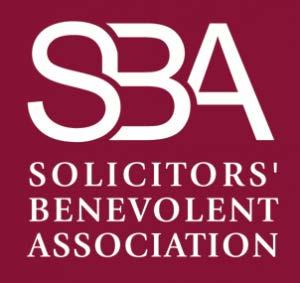
Still Working to Support Members of the Profession
The Solicitors’ Benevolent Association exists for the benefit of all members of the solicitor’s profession and their families, widows and children and is completely funded by voluntary donations from fellow solicitors throughout the island of Ireland.
 Guerin, Partner, Clyde and Co.
Guerin, Partner, Clyde and Co.
Background
The Solicitors’ Benevolent Association had its origin in the year 1863, when, to perpetuate the memory of the late Mr Richard Meade, a fund was collected to found a memorial which subsequently became known as the Meade Benevolent Association for the relief of members of the solicitor’s profession, their wives and families.
Subsequently, on 11th June 1864, it was resolved to extend the scheme and the name was altered to that of the Solicitors’ Benevolent Association Ireland. At that time, it adopted a more professional designation of an Association, and its objectives were:
1. To relieve such poor and necessitous members as may be incapacitated for business through bodily or mental infirmity, or other inevitable calamity and their wives and families,
2. To relieve the poor and necessitous widows and families of deceased members,
3. And in special cases to afford relief to parents or collateral relatives of deceased members and to render the pecuniary assistance to the widows and families of deceased attorneys, solicitors and prompters who were not members at that time of their death.

36 Journal of the LSNI Spring 2024
John
The Solicitors’ Benevolent Association is an all-Ireland body which provides relief, aid and advice to members of the Association and current or former members of the solicitor’s profession in Ireland and to their dependents whose life circumstances may have brought them into material need for any reason. Dependents include spouses, partners and children and in special circumstances the Directors may at their discretion include other related persons as dependents.
Applications for assistance are considered by the Board who may decide to provide financial assistance in the form of monthly payments or occasional grants, and, in some cases, the Board may provide such financial assistance by way of a loan.
The Association’s main income derives from annual voluntary subscriptions paid by members of the solicitor’s profession in both the Republic of Ireland and Northern Ireland, and incomes are also derived from donations, legacies, repayments of grants and fund-raising activities.
The Association is made up of 24 Directors from all over Ireland, both North and South. The Directors provide their services on a voluntary basis and review cases on a monthly basis and, indeed, often have personal contact with those in receipt of grants.
Applications
Applicants are asked for a statement of their monthly income and expenditure together with a statement of their assets and liabilities. Entitlement to state benefits is taken into account when deciding on applications. The level of grant is decided on an individual person’s circumstances and grants may be in the form of a regular monthly payment or a single payment.
Applicants often state when making an application that they never envisaged having to apply for assistance but under the rules of the Association assistance may be given to those in need who are members of the Association or former members of the solicitor’s profession in Ireland and their immediate dependents.
Accordingly, the Association would encourage solicitors, whether practising or retired, to pay the annual voluntary subscription in the knowledge that they are helping their colleagues and their dependents who have fallen on hard times for whatever reason and in the unforeseen event that they may need to call on the Association in the future on their own behalf or that of their families.
Here are some of the situations where the Association has provided assistance. Names have been changed to protect the identity of individuals.
1. Brian was a sole practitioner. In recent times the practice had become unviable, and he was no longer able to support his family and the Association stepped in.
2. Maria was widowed at the age of 45 when her husband who was a solicitor died suddenly and she was unable to
support her children who were in college and required financial assistance until the children were in gainful employment.
3. Joan was working for a large firm until she was diagnosed with a serious illness and had to resign from her employment. She returned to live with her parents who were not in a position to support her.
4. Vincent was a partner in a practice and was forced to retire when he was diagnosed with a long-term illness.
Colin Haddick, Caroline Boston and I have the privilege of acting as Northern Irish Directors of the Solicitors Benevolent Association and the email below is typical of the thanks that we receive when assisting applicants.
Good Afternoon
First of all, I apologise for not contacting you all much sooner - relocating was/ is tough and I am still unpacking. I want to express my sincere gratitude to you individually and as a collective for your help and the increase in grant which I trust you know is really indispensable. I will always be in your debt but hopefully someday I can, even partially, repay the Association for the kindness provided. I do know of one firm who now contribute a fair amount every year as a result of my attempts to shame them into doing so!
I would be grateful if you would pass on my simple acknowledgement and sincere appreciation to all who give of their time to the SBA and also each & every contributor who I want to know are not taken for granted but without whom solicitors, practising or otherwise, and their families may not be able to function.
Regards and every best wish for 2024 and beyond.
The rules relating to unclaimed funds within Solicitor’s client accounts has recently been changed and therefore I thought it was timely to remind the profession that the Solicitors Benevolent Association is a very worthwhile charity into which the unclaimed funds could be placed.
Donations
It is anticipated that there will be increasing demands on the Association’s funds due to the effects of inflation and the increase in cost-of-living expenses. To cover these greater demands additional subscriptions will be more than welcome as will legacies and the proceeds of any fundraising events.
We would encourage solicitor bodies throughout Northern Ireland to donate funds raised from CPD courses and other functions to the Solicitors’ Benevolent Association.

Further information can also be obtained from the Association’s website www.solicitorsbenevolentassocation.com or from any of the Northern Irish Directors listed below:
Colin Haddick
Caroline Boston
John Guerin
Ezine of the LSNI 37 Spring 2024
Development Common Area Management vs. The Sustainable Housing Demand: Risk Solutions for Purchasers
The first quarter of 2024 has seen a revitalisation in the housing market; sales are on the up, many lenders are offering more competitive rates and the demand for housing is at an all-time high. Despite the promising start, solicitors across Northern Ireland are still encountering deal-breaking negotiations associated with the ownership and management of common areas in developments. Title indemnity solutions continue to mitigate the effect these risks may have and help facilitate transactions for purchasers and lenders, as new sustainable development designs aim to increase the volume of common areas.
Sustainable development is at the forefront of all ongoing planning reformations and demands, meaning developers’ duties and considerations extend far beyond just the physical construction of a development, whether it be apartments or affordable housing. These include the potential for green loans, investment opportunities to minimise waiting lists and liaising with both local authorities and town planning departments to allocate land use and zonings in line with recently updated local development plans. An emphasis on enhancing environmentally friendly designs by incorporating more common areas, such as green areas, has additionally become key in ensuring environmental and social wellbeing of the new property owners.
In the conveyancing world, common areas often include roads, footpaths, shared gardens and stairwells. It is common for developers to put in place and document maintenance provisions and obligations regarding the common areas, in addition to granting property owners the right to use such common areas in accordance with their property and in common with the other property owners. The responsibility of carrying out such provisions and obligations usually falls to a dedicated management company who maintain these areas through service charge contributions from the property owners. The developer often transfers ownership of the common areas to such a management company on completion of the build, which may consist of a number or all of the property owners in common, or be an entirely independent

company. This approach is to ensure longterm sustainability of the development.
Unsurprisingly, despite best endeavours to ensure adequate provisions for the transfers of ownership and responsibility of these common areas, many recurring issues have come to fruition. Financial challenges have often led many developers to dissolution, prior to disponing the common areas, resulting in these areas vesting in the Crown. Similarly, other oversights include the failure to create a dedicated management company or a management company that has been set up incorrectly. These issues often result in defects on title, affecting not only the purchaser and their lender, but potentially jeopardising a future sale.
The consequences of these defects are vast, including common areas falling into a state of disrepair. The most prodigious risk however is a challenge to the use of the common areas by the owner of the common areas. A challenge of that nature could prevent the purchaser from accessing their property, running services under the common areas and consequently suffering a loss in market value to their home.
Whilst rectifying these defects might seem the perfect solution, the time and costs associated with these remedies can stymie property transactions further.
Title indemnity solutions continue to help to meet solicitors’ demands in overcoming these issues, whilst protecting the purchasers, lenders and successors. Alas, title indemnity does not remove the need to pay maintenance, but indemnifies the insured should the owner of the common areas prevent their right to use the common parts. This includes protection against any consequential diminution in market value and unlimited legal costs, offered at a one off premium, sitting alongside the title deeds in perpetuity.
These risks have been present for many years, but their impact is now becoming more prevalent. Inevitably, the demand for title indemnity solutions will likely continue to soar with the rise of sustainable developments, as purchasers, lenders and their solicitors seek quick and effective remedies to overcome the hurdles associated with common areas and to help facilitate their transactions.
For more information, please do not hesitate to contact Sarah Gateaud-Manase, Commercial Underwriter at DUAL Asset, sgateaud@dualgroup.com
38 Ezine of the LSNI Spring 2024
DUAL Asset is a trading name of DUAL Corporate Risks Limited which is authorised and regulated by the Financial Conduct Authority No. 312593. Registered in England and Wales under company number 4160680. Registered Office: One Creechurch Place, London, EC3A 5AF, United Kingdom.
Leap into lifelong learning
You may already have the dream career and the qualifications to prove it, but has that satisfied your passion for learning? Perhaps you’d like to develop a new skill or study for a degree in an entirely new subject area. You may even want to take up a post-graduate qualification in a field that will open up new career opportunities.
With The Open University’s (OU) flexible supported distance learning model, you can study for a qualification while you work. The OU offers over 200 highly respected qualifications in a wide range of subjects from Accounting and Finance to Sociology.
Learning around a busy life schedule requires dedication and commitment, but the rewards can be huge, and the OU will be there to support you every step of the way.
If you’d like to try a short taster course or read up about a subject that interests you, OpenLearn (open.edu/openlearn) is a great place to start. OpenLearn is the OU’s free learning platform and is home to over 1000 free courses, articles, videos and more, all ready to be explored at the touch of a button.
Still not sure if lifelong learning is right for you? Read on to discover some of the benefits of continuous learning:
Career advancement: Continuing education can open up new career opportunities and avenues for advancement. It may allow you to specialise in a particular area of law that interests you or to transition into a different field altogether.
Enhanced skillset: Returning to study provides the opportunity to acquire new skills and knowledge that can enhance your effectiveness as a legal professional. This
could include mastering marketing, staying updated on technology, or developing expertise in mental health and wellbeing.
Networking opportunities: Returning to study offers the chance to connect with fellow students, professors, and industry professionals, expanding your professional network. These connections can be invaluable for career growth, providing access to job opportunities, mentorship, and collaboration possibilities.
Personal fulfilment: Pursuing further education later in life can be personally rewarding and fulfilling. It allows you to delve deeper into subjects that interest you, challenge yourself intellectually, and achieve personal goals that may have been deferred earlier in your career.
Brain health: Recent research has found that learning keeps brain cells working at optimum levels, which may slow cognitive and memory decline as we age.
Registration for courses beginning in Autumn 2024 is now open. To explore the OU’s range of undergraduate, postgraduate and short courses visit www.open.ac.uk
From pooches to people
Rea, a graduate from Northern Ireland used her OU degree to completely change career…
Before studying with the OU, Rea had an educational background in Animal Science and Veterinary Nursing spanning almost a decade. Having seen an OU advert on TV, she decided to make a change and start a BSc in Psychology. She now works as a Forensic Psychologist within the NHS. Asked why she shifted direction, Rea had this to say:
“We are only here for but a blip of time so make the most of it by doing something you love”.
Asked what impact OU study had on her, Rea said:
“Everything. It opens up so many doors for people to grow personally, professionally, academically and financially. If you are thinking of starting at the OU – I advise you go for it. Trust your instinct, it’s there for a reason.”


Ezine of the LSNI 39 Spring 2024
Society represented at European Presidents’ Conference in Vienna
The President of the Law Society of Northern Ireland, Darren Toombs joined elected representatives from lawyers’ organisations at the recent 52nd European Presidents’ Conference held in Vienna Austria.
The President was representing the Society at the Conference which is recognised as an
important forum for dialogue for elected representatives of lawyers’ organisations from across Europe.
The conference provides a platform to share best practice and discuss issues of importance affecting the legal profession in various jurisdictions.

The President attended a series of receptions/events hosted by the Mayor of the City of Vienna, Austrian Bar and the Austrian Federal Chancellor and Austrian Federal Minister of Justice.
He also contributed at the main Presidents’ Conference held on the theme of “Big data, fewer rights – will AI change the rule of law forever?”

IPLS Team win Client Consultation Competition 2024
The 2024 Northern Ireland regional of the Client Consultation Competition took place on 19 January 2024 at Law Society House in Belfast. The topic was International Humanitarian Law.
The teams consisted of Anna Thompson and Katie Kennedy from the Institute of Professional Legal Studies (IPLS), with their coach Mr Stuart Harper, and Erika Lim and Amy Hanna from Queen’s University Belfast, with their coach Dr John Taggart.
The winners were the team from IPLS who received a financial contribution from their Society towards their attendance at the 2024 International Client Consultation Competition which took place in Lublin, Poland from the 10th to 13th April 2024. It was hosted by the John Paul II Catholic University of Lublin in partnership with Ukraine. The IPLS team were runners-up in this competition.
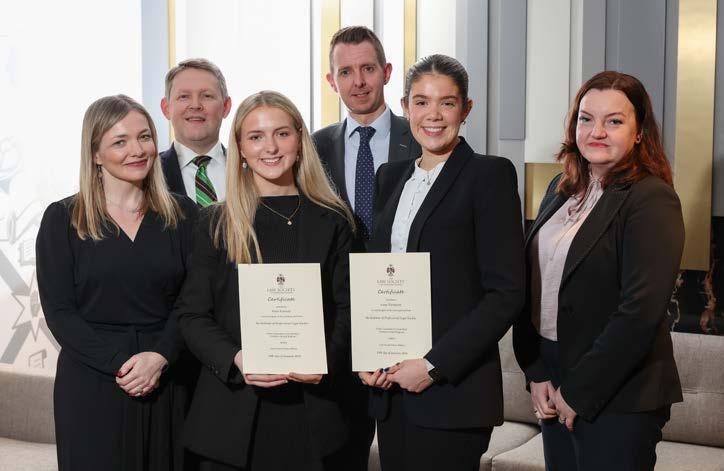
Front centre: Winning team of Katie Kennedy and Anna Thompson from the Institute of Professional Legal Studies.
The local judging panel was chaired by Niall Hargan (Carson McDowell) and included Laura Dawson (Northern Ireland Human Rights Commission), Joe McVeigh (KRW Law) and Joanna Tobolska-Walczuk (PR Hanna). A special thanks also to Colin Caughey from NIHRC for his time and effort in composing the scenario.
40 Journal of the LSNI Spring 2024
A celebration of commitment at the Newry & Banbridge dinner
The President of the Society, Darren Toombs joined members of the Judiciary and solicitor profession for the Newry & Banbridge Solicitors Association Annual Judges’ Dinner.
Despite the inclement weather, over 120 members of the legal profession from across South Down and South Armagh joined colleagues at the Killeavey Castle Hotel, for a celebration of the year gone past and of the year ahead.
Those attending had the opportunity to hear from keynote speakers including Kevin Neary, Chair of Newry and Banbridge Association, and Donal O’Donnell, Chief Justice of Ireland.
The Chief Justice reminded attendees he was in fact the third Chief Justice with strong Newry links referring to Lady Chief Justice, Dame Siobhan Keegan who is from Newry and Lord Russell of Killowen who was born in Dominic Street in Newry and later became Chief Justice of England and Wales.
Those attending also heard the Association’s tribute to District Judge Paul Copeland following the announcement of his retirement. Commenting the Chair of Newry and Banbridge Association, Kevin Neary said
“I am delighted that so many colleagues joined us to celebrate the achievements of the local Association and its members. As Chair I wish to thank our keynote speakers and to take this opportunity to recognise the contribution which Paul Copeland has made serving the people of this area as a District Judge and for his professionalism and friendship towards our members”.
Darren Toombs, President of the Law Society of Northern Ireland said:
“Thank you to the Newry and Banbridge Association for their kind invitation to attend and to celebrate the work and the services which local members provide to the community of South Down and South Armagh”.

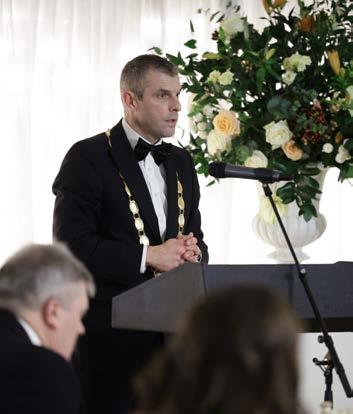



Journal of the LSNI 41 Spring 2024
Kevin Neary, Chair of the N&B Association.
Darren Toombs, President LSNI.
District Judge Paul Copeland.
Donal O’Donnell, Chief Justice of Ireland.
Darren Toombs, President LSNI, District Judge Anne Marshall, The Honourable Mr Justice Kinney, Kevin Neary, Chair of the N&B Association.
The Limavady Solicitors Association Dinner
The Limavady Solicitors Association Dinner took place at the Roe Park Resort, Limavady.
Twenty-four members of Judiciary and local solicitors were in attendance and they had an opportunity to hear from a series of speakers including from the Law Society, President Darren Toombs and the Chief Executive David A Lavery CB.
Also speaking at the event was the Limavady Solicitors Association President, Keith Leighton and District Judge Peter King who replied on behalf of guests.
Former District Judge Hilary Keegan wound-up the evening in his own special way with a treasure chest of great gags and Brendan Devlin BL spoke on behalf of the Bar.

BSA Team pipped at the post at charity football event
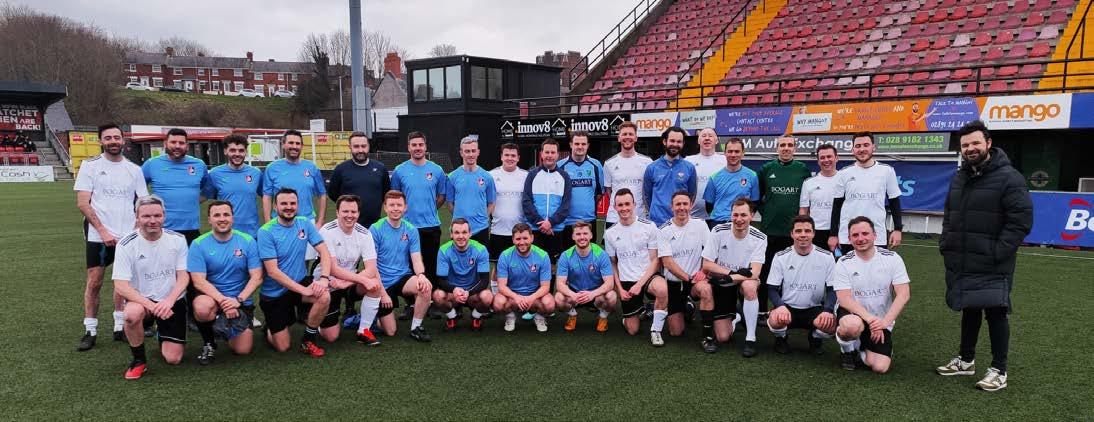
Crusaders football ground played host to the match of the season as two teams from the legal profession battled it out to raise money for the BSA Charity of the year.
The match, which took place on Friday 8th March 2024, involved teams from the Belfast Solicitors Association (BSA) and from the Bar. Despite the inclement weather both teams set about the battle royale with gusto with near misses, lots of shouting and the smell of deep heat muscle rub permeating the air.
After nearly 82 minutes played and despite the best efforts of BSA Captain, Sean O’ Neill (PPS), KRW’s Colin McMenamin and Andy Morrow (MTB) the game remained scoreless.
Just when they thought it was all over ……the Bar scored with goals from Captain Sean Mullan and Eamann Donnelly.
A victory for the Bar team on this occasion but sights have been set on a rematch when Chris McCann’s (Harte Coyle Collins) BSA team will be aiming for victory.
The BSA thanks everyone who played, attended, lent their support and made donations in support of the BSA charity of the year.
42 Ezine of the LSNI Spring 2024
New Houses in Multiple Occupation book is essential reading
The Lady Chief Justice, The Right Honourable Dame Siobhan Keegan and members of the legal profession were in attendance at Law Society House in Belfast for the launch of a new book aimed at anyone involved in the private rented sector in Northern Ireland.
The new book entitled The Law of Houses in Multiple Occupation in Northern Ireland is regarded as essential reading for landlords, tenants, their legal advisers, letting agents and local councils.
Written by local solicitor Charles O’Neill the book explains the law and associated legislation relating to Houses in Multiple Occupation (HMOs), an important element of housing in Northern Ireland.
The new book covers all aspects of the Houses in Multiple Occupation Act (NI) 2016 including the definition, requirement, process of applying for a licence, appeals and enforcement of HMO in Northern Ireland.
Commenting on the launch of the new book, Darren Toombs, President of the Law Society of Northern Ireland said:
“I would like to personally thank Charles for writing this new book which provides much needed clarity on issues relating to Houses in Multiple Occupation in Northern Ireland”.

Derval McFetridge, Information & Research Manager at the Law Society said:
“We have had a positive response from our members to the new publication. I would encourage all those wishing to secure a copy to please contact me”.
The new book costs £50 and can be obtained by contacting the Society’s Library by emailing library@lawsoc-ni.org or by phoning 028 9023 1614 ext. 427

Spring 2024 Edition of the Journal of Elder Law & Capacity
Journal of Elder Law and Capacity
The Law Society of Northern Ireland is delighted to publish the Spring edition of Journal of Elder Law and Capacity.
The Journal of Elder Law and Capacity is a source of information for a range of practitioners dealing in all aspects of elder law and capacity.
Published by the Law Society of Northern Ireland, it aims to have UK and international appeal with coverage on legal issues relevant to elder clients, clients with capacity issues, their families and carers.
In this edition
• Liberty Tactics: On the rise of ‘Deprivation of Liberty Safeguards’ - Lucy Series
• The Use of the Declaratory Jurisdiction of the High Court in the Field of Health and Social Care in Northern Ireland - Michael Potter
• Capacity – Navigating through your Regulatory Obligations - John Mackell
• The Solicitor Executor: Some Reflections from Practice and Some Pitfalls
• Part Two - Preparing the Will: Taking Instructions and Drafting ConsiderationsSheena Grattan
• Funding Long-Term Residential Care - Barra Gorman
• Substantial unclaimed discounts on rates and local council tax. Are your clients with severe mental impairment losing out? - Linda Johnston
• Casenotes - Andrew Kirkpatrick, (TEP, Solicitor, Murray Kelly Moore) & Rachel Sullivan, BL, 39 Essex Chambers
https://lnkd.in/e9bvN9tX
Ezine of the LSNI 43 Spring 2024
Charles O’Neill pictured with Darren Toombs, President of the Law Society of Northern Ireland and The Lady Chief Justice Dame Siobhan Keegan.
JOURNAL OF ELDER LAW AND CAPACITY 2024 ISSUE The Law Society of Northern Ireland
2024 I SPRING
Mentoring Programme Networking Event
Law Society House in Belfast was the venue for the latest networking event hosted in late January as part of the Law Society of Northern Ireland’s Mentoring Programme.
Established over a decade ago, the programme continues to provide support to members of the solicitor profession on business and career issues through experienced and trained Mentors who share their knowledge, skills and experiences.
The scheme continues to go from strength to strength with increasing numbers of solicitors from across Northern Ireland participating as mentors and mentees.
Those attending had the opportunity to hear from Andrew Godden, Professional Development and Training Lead for the Law Society of Northern Ireland, Niamh Shiells from Advance Coaching, Suzanne Wylie, Chief Executive of the Northern Ireland Chamber of Commerce, Jude Copeland, legal technology specialist from Cleaver Fulton Rankin and

Lorraine Acheson, Managing Director of Women in Business.
Commenting Dr Andrew Godden, Professional Development and Training Lead for the Law Society of Northern Ireland said:
“The Society is delighted to host the latest in a series of networking events which provide the perfect occasion for attendees to connect with peers and colleagues in a relaxed and informal setting and learn more about the Mentoring Programme”.
Law Society raises over £13,000 for Include Youth charity
Past President, Brian Archer was joined by representatives from Include Youth for the grand reveal of the total money raised for his chosen charity of 2023.
Brian was joined by Claire Meenehan (Skills Manager) and Donna O’Neill (Snr Employability & Employer Liaison Worker) from Include Youth to announce that £13045.55 had been raised.
The money will now go towards supporting the work which Include Youth provides in actively promoting the rights, best interests of young people with care experience and from disadvantaged communities.
Commenting former President, Brian Archer said:
“I am truly delighted by the sum of money raised which I hope will go some way to supporting the invaluable work Include Youth provide”.
Claire Meenehan (Skills Manager) with Include Youth said:
“Thank you to the Law Society and its members for supporting us as their charity of the year in 2023 and for helping to raise this fantastic sum of money for Include Youth”.

44 Ezine of the LSNI Spring 2024
From left: Dr Andrew Godden, Law Society of Northern Ireland, Lorraine Acheson, Managing Director of Women in Business, Jude Copeland, Cleaver Fulton Rankin, Niamh Shiells, Suzanne Wylie, Chief Executive of the Northern Ireland Chamber.
Ross White elected as Chair of the NIYSA
In January 2024 the Northern Ireland Young Solicitors’ Association (“NIYSA”) elected Ross White as their new Chair. Ross a Legal Counsel at Hillsborough based construction company, GRAHAM, succeeded Shannon Gawley following the association’s AGM at Law Society House.
Commenting on his election he said:
“2024 marks the 40th anniversary of the NIYSA and I am looking forward to working with the newly elected committee and our members to make this anniversary year a memorable one. I am committed to representing and advancing the views of young solicitors in this jurisdiction, as well as strengthening our network with our counterparts in the UK, Ireland and our colleagues across Europe and further afield.”
The other Committee Members are:
• Emma Falloon of Kennedys Law (Vice Chair);
• William Wilson (Treasurer) and Shannan Greer, both of Thompson Crooks;
• Katherine Grant and Victoria Kinkaid, both of Carson McDowell;
• Emma Doherty of Tughans;
• Katherine McAuley of Joseph Magee and Co;
• Aisling Creegan of Lacey Solicitors and
• Tony McCann (IPLS Representative) of McCartan Turkington Breen.


What is the NIYSA?
The Northern Ireland Young Solicitors’ Association (NIYSA) was set up in 1984 by Harry Coll, the then President of the Law Society of Northern Ireland.
Its aims are to: -
• Represent the views of young solicitors in Northern Ireland.
• Promote and advance the interests of young solicitors generally and those of the legal profession.
• Organise activities of an educational and social nature.
• Encourage contact with other young solicitors’ Associations and with other professions.
How can I join NIYSA?
If you are a solicitor who has not reached ten years’ post qualification experience (PQE) then you are eligible to become member of the NIYSA.
How much does it cost to join?
Currently there is no joining fee but we may ask for your financial support at our CPD and social events throughout the year.
Interested in joining & want to know more?
Please email niyoungsolicitors@gmail.com
Please provide your
• Name
• Current firm/organisation or other
• Your address
• Contact phone number and
• Your email address
Lastly please indicate in your email if you are happy for us to retain your data to be used to contact you.
Ezine of the LSNI 45 Spring 2024

From the CourtsAbstracts of recent Case Law
Below please find headnotes and links to the full text of selected judgments from the High Court and Court of Appeal.
Please note that these headnotes are for guidance only.
CRIMINAL LAW
R v Bond
Defendant was arraigned on 19 January 2023 and pleaded not guilty to all three offences on the indictment. - possession of firearm and ammunition. - possession of a handgun.following arraignment defendant pleaded guilty to possession of a firearm and ammunition with intent to endanger life or cause serious damage to property or to enable another person to endanger life or cause serious damage. - firearm had been given to the defendant who stored it in a shed in his garden.firearm was a homemade, functioning firearm. - UDA paraphernalia found during house search - defendant had previously been present at commemorative parades organised by a political grouping. - whether offence had a terrorist connection. - defendant accepts that he is a loyalist but disputes any involvement with paramilitaries.defendant gave a false account to police and continues to maintain an account to the PBNI that is inconsistent with his guilty plea.HELD THAT a custodial sentence of 6 years with an additional period of 12 months is to be served.defendant subject to notification requirements for 15 years.
9 January 2024
Smyth, HHJ Crown Court
R v LT
Applicant tried before Judge and a jury on a indictment containing 21 counts of sexual abuse against his daughter.unanimous verdict of guilty on all
counts and sentenced to 16 years’ imprisonment on 11 October 2023. - leave to appeal was refused.leave to adduce. - letter from an alleged juror alleging irregularities in the deliberative process of the jury received by senior counsel of applicant six weeks after the conclusion of the trial. - letter then withdrawn. - request by jury member to rewatch section of ABE interviews due to inability to hear some of the spoken word properly. - jury do not have access to the transcript while watching recording. - neither defence or prosecution raised any objection at the time to the request. - whether trial judge failed to properly balance the risk of the jury attaching weight to this evidence they had reheard. - consideration of Rawlings. - warning given by Judge at the time to alert jury to the risk of giving ABE disproportionate weight.contamination and collusion.
- HELD THAT no unfairness was adopted during the trial and the conviction is not unsafe. - case dismissed
23 February 2024
Treacy, LJ Court of Appeal
R v William Sholdis
Appeal against a sentence of 12 months imposed on applicant for various offences including making of indecent photographs or pseudo photographs and possession of extreme images and prohibited images. - applicant had admitted to downloading illegal material when arrested and that his offending started when he received spam email. - no previous criminal record. - 33 year old single male who lived with parents.
- diagnosis of autism with an educational statement since primary school. - prior to the offences he had a full-time job as a pay-roll administrator which has since been removed from him. - whether applicant is a risk of serious harm to the public. - whether he will re-offend.consideration of rehabilitation.
- HELD THAT sentence imposed is substituted by a three-year probation order. - SOPO remains in place.
15 January 2024
Keegan, LCJ Court of Appeal
In the matter of an application by John Sheehy for leave to apply for judicial review Applicant is obliged to serve two thirds of his determinate custodial sentence prior to being eligible for release which would be assessed by the Parole Commissioners. - whether applicant is entitled to have his solicitor present at meetings with his Supervising Officer as part of the process leading to consideration by the Parole Commissioners. - applicant is from Kerry and has no familial connections to Northern Ireland and requested to have his solicitor present. - whether application is out of time.whether a good reason has been established. - fettering of discretion. - whether personal circumstances of applicant placed him in an exceptional group.HELD THAT none of the grounds advanced by the applicant meet the threshold to allow leave.application was also out of time and the applicant did not provide a good reason for the delay. -
claim dismissed
6 February 2024
Humphreys, J
Kings Bench Division
EMPLOYMENT
Geoffrey Wilson v Alliance Party of Northern Ireland Appeal arising out of unsuccessful Industrial Tribunal proceedings. - appellant had complained he had been the victim of direct age discrimination and direct political discrimination. - member of Alliance since 2012 and had applied to be an Alliance Party candidate for certain elections but each application was unsuccessful. - refusal of Alliance Party to participate actively in appeal proceedings. - unlawful refusal to adjourn. - bias.consideration of Constitution and Rules of the Alliance Party. - HELD THAT amended grounds of appeal are not meritorious and the appeal is dismissed.
26 January 2024
McCloskey, LJ Court of Appeal
ENFORCEMENT OF JUDGMENTS
Brenda Brewster v The Northern Ireland Courts and Tribunals Service and Ciaran McKavanagh Appeal under Judgments Enforcement (NI) Order 1981 a.140(3). - applicant seeks to set aside order of the Master made on 23 May 2023. - Master had made an order discharging an order charging land (OCL) which had been made against a property belonging to the second respondent, Mr Kavanagh. -
46 Ezine of the LSNI Spring 2024
whether proceedings were unfair, caused an injustice and constituted victimisation against the applicant. - there had previously been several orders as part of ancillary relief proceedings following the marriage breakdown dating back to 2012. - Mr Kavanagh had been ordered to pay towards the mortgage on the former matrimonial home. - failure to pay. - mortgage arrears.maintenance arrears. - whether original OCL has any independent existence. - whether payments had been subsequently made by Mr McKavanagh and no monies remain owing. - whether OCL that has been made redundant can be revived by amending terms to enforce a different and later judgment. - whether appeal is academic as Ms Brewster has sought and obtained a fresh OCL.HELD THAT appeal is dismissed.
18 January 2024
Scoffield, J Court of Appeal
EVIDENCE
The King v Sean Farrell and Gerard Maguire; Ruling No.1: Potential challenge to the admissibility of evidence given by members of An Garda Siochana
Admissibility of evidence given by members of An Garda Siochana.evidence referred to information provided to Gardai in relation to two vehicles. - vehicles were connected to an incident in Derry where an explosive device was placed beneath an off-duty police officer’s private motor car. - Gardai had stopped the car under Offences against the State Act s.30 and searched the vehicle and occupants. - search of route taken by car located nylon gloves which were sent for examination. - further three pairs of gloves were found at the roadside in a different location and forwarded for examination. - admissibility of all evidence. - whether unconstitutional or unlawful behaviour by Gardai.interpretation and adjudication
of law from another jurisdiction.
- judicial notice. - HELD THAT no requirement on behalf of defence to give advance notice to the prosecution and witnesses for the prosecution of the ways in which the admissibility of the prosecution evidence may be attacked at this stage. - suitably qualified expert will be required rather than the reliance of judicial notice.
13 March 2024
Rooney, J Crown Court
HEALTH & SAFETY
Stephen Fenwick v Mark Lyons t/a Lyons Transport Plaintiff had a valid HGV licence and on occasion the defendant who owned a haulage business employed him on a casual basis to transport goods using a truck owned by defendant. - defendant would pay plaintiff either by cheque or cash. - plaintiff received instructions to collect and deliver maize for the defendant. - plaintiff was not aware that the truck was owned by Toptranz European Ltd.whilst unloading the truck, plaintiff became aware tarpaulin was faulty and whilst trying to secure it fell to the ground and suffered a fracture and injury to his back. - health and safety. - defendant denies employing the plaintiff. - whether legal relationship between them. - whether defendant owed duty of care to plaintiff. - whether defendant had been incorrectly sued. - ownership of truck.whether Toptranz had instructed the defendant to engage the plaintiff. - whether Toptranz were subcontractors to the defendant.
- failure to comply with Work at Height Regulations (NI) 2005.
- HELD THAT the defendant is a dishonest and untrustworthy witness. - due to negligence and breach of duty of defendant, plaintiff sustained significant injuries. - defendant to pay plaintiff £42,500 plus interest and costs
11 March 2024
Rooney, J Kings Bench Division
INHERITANCE LAW
John Robert Irvine v Gerard Drain (as executor of the estate of Robert John Irvine (deceased), Gillian Napier and Heather Verner Estoppel. - plaintiff believed that his father’s interest in jointly farmed lands would pass to him in their entirety on his father’s death. - verbal assurance. - farming partnership established between plaintiff and father from 1970 onwards. - some lands and the farm were registered in the name of the plaintiff’s father solely.- further lands purchased were in joint names. - plaintiff also built his matrimonial home on land transferred to him adjacent to the home farm. - plaintiff’s father and mother had made a will on 5 December 2007 detailing gifts of land for family members which are the subject of the case. - testamentary arrangements. - business should pass to plaintiff. - whether sisters or their children were actively involved in the farm. - no evidence exists that all land would pass to plaintiff upon the death of his father. - father indicated that he wanted to be “fair to his wife and daughters” regarding his will. - whether lands are integral to the farming business. - HELD THAT plaintiff had failed to prove the crucial elements of proprietary estoppel and for these reasons the case is dismissed 6 March 2024
Huddleston, J Chancery Division
INQUESTS
In the matter of an inquest touching the death of Sean Brown; open ruling in the claim for public interest immunity
Inquest into investigation into death of Mr Sean Brown on 19 May 1997. - request for public interest immunity certificate - withholding of information by MOD, Security Service and
Police Service of NI. - whether material is relevant to the inquest and would in the normal course be disclosed in the inquest. - satisfied that documents are relevant and should be disclosed if there was not a PII claim. - whether availability of documents could cause harm to national security. - consideration of Litvenenko [2013] EWHC 3724 (Admin). - whether risks can be protected by other means or limited disclosure. - HELD THAT applications for PII in large part should be upheld including names, reference numbers and other details relating to individuals, dates as well as the grading of intelligence which should not be disclosed. - parties will be provided with a gist of information. - as a result of the limited disclosure of information a proper investigation by the Coroner cannot take place. - Coroner to request a public inquiry be established to allow evidence to be heard in closed session and allow a full examination of how the investigations into the murder were conducted.
4 March 2024
Kinney, J Coroner’s Court
In the matter of an inquest into the deaths of Daniel Doherty and William Fleming and the ruling on anonymity and screening applicationPW16
Application by PW16 for anonymity and screening and provision to give his evidence via video link. - assessment of security risk. - threat assessment. - applicant is a retired police officer and now business owner. - subjected to death threats previously and relocated. - adheres to a series of security measures. - risk of family members. - HELD THAT applicant can give evidence remotely.
21 February 2024
Huddleston, J Coroner’s Court
Journal of the LSNI 47 Spring 2024
In the matter of an inquest into the deaths of John Dougal, Patrick Butler, Noel Fitzpatrick, David McCafferty and Margaret Gargan (The Springhill Inquest) and ruling (Number 4) on additional applications for PIP Status from former military witnesses
Inquest into five deaths which occurred on 9 July 1972 in Springhill and Westrock.application for properly interested person (PIP) status on behalf of three former military witnesses (FMW’s). - whether FMW are at risk of wrongdoing - whether wrongdoing caused or materially contributed to the death or deaths under investigation. - whether PIP status is premature. - whether they discharged weapons on the night in question. - HELD THAT PIP status is granted to the three FMW’s.
29 January 2024
Scoffield, J Coroner’s Court
LEGISLATION (PRACTICE)
In the matter of an application by the Children’s Law Centre for leave to apply for judicial review Application for leave to apply for judicial review. - seeks to challenge the legality of the process which led to the enactment of the Budget (No. 2) Act 2023. - seeks to impugn the failure to conduct a cumulative equality impact assessment (CEIA) into the overall impact the budgetary provisions would have on children and young people.Northern Ireland Act 1998 s.75. - whether arguable case with realistic prospect of success. - HELD THAT the applicant has an arguable case and leave is granted.
31 January 2024
Humphreys, J Kings Bench Division
PRISONER RIGHTS
In the matter of an application by Matthew Johnson for leave to apply for judicial review
Leave to apply for judicial review.
- application to attend funeral of aunt. - applicant is a sentenced prisoner charged with serious firearms offences. - application for temporary release to the prison service was refused. - applicant is subject to the Multi-Agency Review Arrangements and meets the definition of a terrorist risk offender. - location of funeral arrangements present a significant risk to prison staff. - whether refusal is an interference with Article 8 right. - whether clear disciplinary record considered. - whether evidence of previous compassionate leave considered. -failure to take into account relevant factors by Prison Service.
- HELD THAT leave is granted.applicant to attend the funeral accompanied by a chaperone from Phoenix Law under certain conditions
4 January 2024
Humphreys, J Kings Bench Division
SENTENCING
R v Gary Magee
Defendant charged with murder of Andrew James Thompson and with arson endangering life with intent.
- when rearraigned defendant pleaded guilty to manslaughter and arson. - Mr Thompson had died at the scene from smoke inhalation. - defendant was badly injured. - deceased had been a friend of defendant and both had been in the defendant’s house on the night of his death. - both men had consumed alcohol.defendant had no recollection of setting the fires. - defendant had a history of starting fires in other properties. - victim impact statements. - manslaughter - dangerousness. - whether high likelihood of reoffending. - consideration of defendant’s personal circumstances. - HELD THAT defendant is sentenced to 7 years with 3.5 years in prison and 3.5 years on licence.
7 February 2024
McBride, J Crown Court
R v Connor McNeill
Connor McNeill pleaded guilty to the murder of Stephen Barriskill. - determine the minimum term of imprisonment following a life sentence. - McNeill had entered Mr Barriskill’s home and shot him twice in the chest while he was sleeping. - both men had been neighbours and had recently fallen out. - McNeill went to the police station with his wife and handed himself in the following day. - alleged that he had been threatened by the deceased but had destroyed the phone which had the threatening messages. - whether accidental shooting. - whether intended to “ scare” victim. - victim impact statements of deceased family members - pre-sentence reports. - mitigating circumstances.HELD THAT tariff is set at 15 1/2 years. - Parole Commissioners will determine if it is safe to release into community to serve the remainder of the life sentence 13 October 2023 Smyth. HHJ Crown Court
R v TF
Appellant had been sentenced to a determinate sentence of 18 months’ imprisonment split equally between custody and licence for offences against his four children including eight common assaults and two specimen offences of cruelty to children. - whether insufficient weight was given by the judge to the appellant’s post offence rehabilitation evidence by probation completion. - whether non custodial option. - whether appellant poses a risk of serious harm. - whether he had taken full responsibility for his offending. - complex medical history and mental health difficulties. - impact on children. - high harm, high culpability case. - HELD THAT sentence is affirmed and appeal dismissed 16 February 2024.
Keegan LCJ, Treacy, LJ and McBride, J Court of Appeal
TERRORISM
In the matter of an application by Colm Cameron for judicial review (No.1 and No. 2)
Appeal against judgments by Humphreys, J dated 17 May 2023. - appellant is son of James Cameron who was murdered by UFF on 26 October 1993. - failure of HET to release findings in the death and alleged failure by PSNI and PONI to complete a proper investigation into his father’s death. - European Convention of Human Rights article 2. - Brecknell analysis.whether investigation failed to deal with alleged collusion.whether informants’ presence was investigated. - whether revival of investigative obligation. - HELD THAT appellant’s arguments are rejected and appeal is dismissed 20 February 2024 Keegan, LCJ Court of Appeal
TIME LIMITS
Michael McKeown v Chief Constable of the Police Service of Northern Ireland Application by plaintiff for an order to extend time for serving a notice of appeal following dismissal of the claim in the County Court. - cause of action relates to alleged false imprisonment, assault, battery and trespass to the person, breach of statutory duty by defendant in relation to arrest and detention of plaintiff.- civil bill had been issued seeking damages for personal injury. - delay in service of notice of appeal. - time limits. - extension of time. - HELD THAT time is extended to allow the lodgment of appeal from the county court. 18 January 2024
Master Harvey Kings Bench Division
48 Ezine of the LSNI Spring 2024
THE LAW CLUB
The Law Club at Law Society House in Belfast.
Situated on the fourth floor, it offers a contemporary and inviting location to have a free tea/coffee and a catch up with friends, a place to reflect or work.
With a stylish design, spacious seating areas, IT supported consultation rooms and open to all Members from 9am - 5pm (Monday to Friday) the Law Club offers a unique Membership experience.
Please visit The Law Club and see for yourself what’s on offer.





In an era of non-stop noise, having a suitable space to talk through any issue is invaluable.
The Meeting Space at Law Society House is a specially designed, state of the art facility that provides the room to think and act with clarity and care.

Located in the heart of Belfast’s Legal Quarter, with spacious plenary and meeting rooms, break out areas and coffee docks, it is the perfect city centre base for solicitors and also an excellent choice for seminars, presentations, and gatherings for any business sector.
The Meeting Space at Law Society House is all about flexibility. You can book one or more of our rooms in a combination that meets your exact needs. All with full video conferencing facilities.
Complimentary tea, coffee and water is available for all users.
For Bookings:
Telephone: 028 9622 7437
Email: meetingspace@lawsoc-ni.org
Website: themeetingspaceni.co.uk














 The family of Edward Bergin receiving the Admission Certificate and Professional Conduct Prize from the Lady Chief Justice, Dame Siobhan Keegan and the President of the Law Society of Northern Ireland, Darren Toombs.
The family of Edward Bergin receiving the Admission Certificate and Professional Conduct Prize from the Lady Chief Justice, Dame Siobhan Keegan and the President of the Law Society of Northern Ireland, Darren Toombs.
























 Nuala McMahon, Senior Policy Officer, Law Society of Northern Ireland
Nuala McMahon, Senior Policy Officer, Law Society of Northern Ireland






 Andrew Millar, Interim Director of
Andrew Millar, Interim Director of
 Paul Tweed, Solicitor
Paul Tweed, Solicitor



















 Guerin, Partner, Clyde and Co.
Guerin, Partner, Clyde and Co.
















































